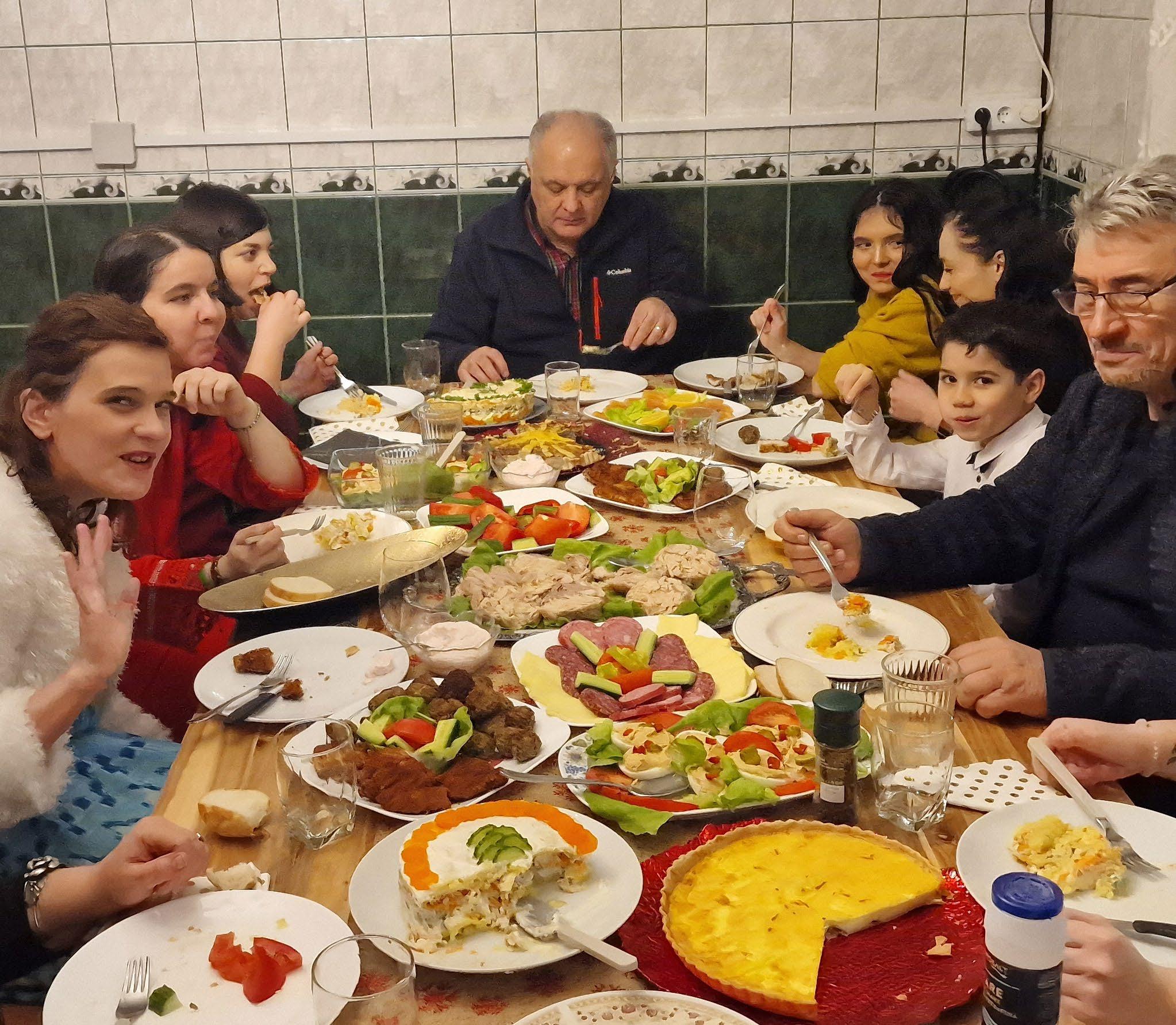

BEAUTY FROM BROKENESS:
Nazarene Churches
A Church Reborn from the Taal Eruption
MOBILIZE YOUR CHURCH TO SHARE CHRIST’S LOVE.

With updated Crisis Care Kit guidelines and new Child Sponsorship promo materials, engaging your congregation in compassionate ministry is easier than ever.

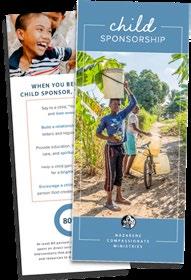

ISSUE 01 • 2025
NCM Magazine aims to tell stories of the church living out Christ's compassion. Our hope is that all of us would hear the call to compassion as a lifestyle.
Following the example of Jesus, Nazarene Compassionate Ministries partners with local congregations around the world to clothe, shelter, feed, heal, educate, and live in solidarity with those who sufer under oppression, injustice, violence, poverty, hunger, and disease. NCM exists in and through the Church of the Nazarene to proclaim the gospel to all people in word and deed.
NAZARENE COMPASSIONATE MINISTRIES 17001 Prairie Star Pkwy, Lenexa, KS 66220 (800) 310-6362, info@ncm.org
For new CRISIS CARE KIT instructions, visit: NCM.ORG/KITSANDPAKS
For new CHILD SPONSORSHIP promotional material, visit: NCM.ORG/PROMOTE
COVER PHOTO: Eurasia Region
MAGAZINE DESIGN: Prelude FOR A FREE SUBSCRIPTION visit ncm.org/magazine
SUBSCRIPTION CHANGES email info@ncm.org or write to NCM Magazine, 17001 Prairie Star Pkwy, Lenexa, KS 66220
QUESTIONS? COMMENTS? email info@ncm.org
Unless otherwise indicated, all Scripture quotations are from the New Revised Standard Version (NRSV) of the Bible, copyright 1989 by Division of Christian Education of the National Council of Churches of Christ in the U.S.A. Used by permission. All rights reserved.
OUT OF THE ASHES: 12
Nazarene churches respond with hope after California wildfres.
16 FAITH UNSHAKEN
Taal Volcano, a picturesque natural wonder surrounded by a serene lake and a favorite tourist attraction, transformed from a tranquil beauty into a source of unimaginable destruction.
20 BEAUTY FROM BROKENNESS
Survivors of human trafcking are welcomed into the shelter of the Open Door Foundation in Bucharest, Romania.
32 FROM SCARCITY TO ABUNDANCE
Nazarene Compassionate Ministries in partnership with local churches in Kenya initiated a community-led water project to provide sustainable access to clean water.
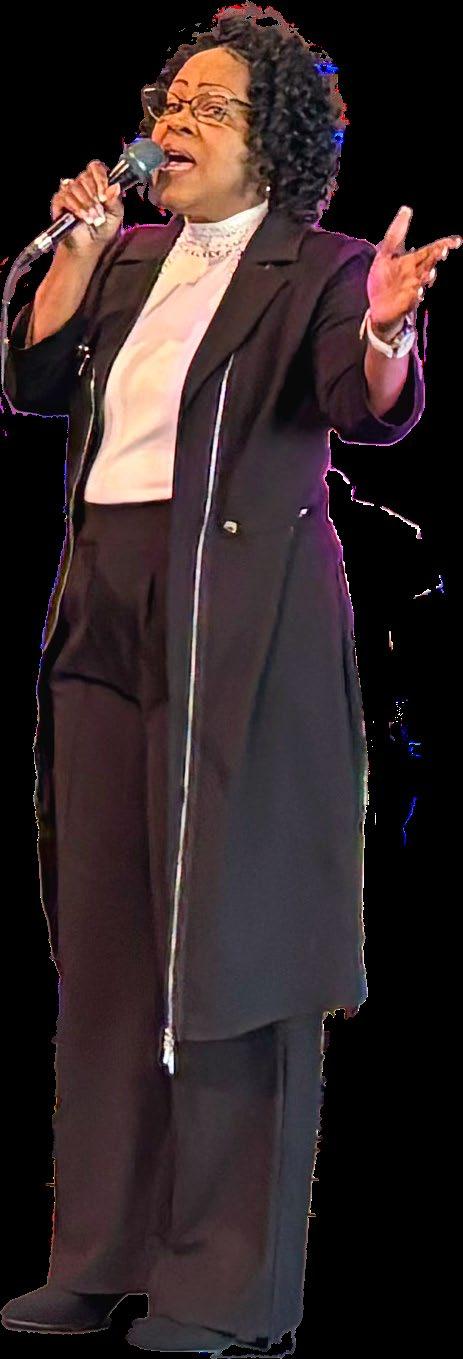

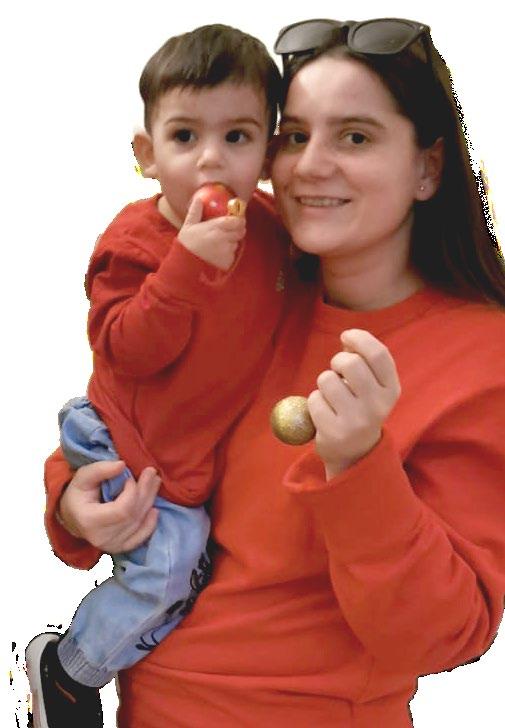

opening notes

LOVE THAT MOVES
Our Christian identity and how we live in the world are rooted in God in Jesus Christ. We are fundamentally God’s beloved. God invites us to live in the way of Jesus, who brings hope and restoration to the world. In Scripture, we come to know who we are as God’s people by how God acts. Here, we discover that God’s compassion and loving-kindness throughout the Old and New Testaments continually point toward a loving God.
“ The Lord, the Lord, a God merciful and gracious, slow to anger, and abounding in steadfast love (hesed) and faithfulness...”
- Exodus 34:6
“ For as high as the heavens are above the earth, so great is his hesed toward those who fear him.”
- Psalm 103:11
“All the paths of the Lord are hesed and faithfulness to those who keep his covenant.”
- Psalm 25:10

During the 2016 Compassion Conference, the late Dr. Roger Hahn shared the roots of compassion in Scripture. There are six Greek words for compassion found in the New Testament. The most common word Σπλαγχνίζομαι (splanchnizomai), occurs 12 times in the Gospels, nine of which are about Jesus acting with compassion. The remaining three times the word is used, we find it in Jesus’ parables where he describes human action. Herein, we find that compassion means more than just a feeling. Rather, it is a deep motivation to act compassionately. More than sadness or sympathy alone, this compassion conveys something profound and mysterious, moving us to action. The Gospels often relay that Jesus was motivated by such compassion when he saw people “who were like sheep without a shepherd,” such as crowds of people harassed and helpless, sick people, hungry people, blind people, a leper, a grieving (and destitute) widow and mother. Undoubtedly, people who were lost and in need motivated the Son of God to act.
HESED – loving kindness, covenantal love
Jesus' actions go back to God's own compassion for the people of Israel, which was often linked to the Hebrew word hesed, meaning loving kindness or faithfulness. Compassion motivated the covenant relationships that God sought with His people. It is through this compassion that God says, "You are my children, my chosen ones.”
Jesus acts with compassion because this is the nature of the God we serve. Who God is and how God acts is central
to our identity as followers of Jesus. What is more, our human understanding of compassion and God’s calling toward compassion has its roots in God’s very nature. There are nine Hebrew words associated with compassion in the Old Testament and 117 occurrences of compassion/compassionate. Of the 117 occurrences, 78 have to do with either divine or human action and 29 refer to divine or human character (only one reference to human character). The Old Testament reveals compassion as a practice rather than an abstract concept. This points us to how God’s compassionate nature is active and not merely an attribute of God’s character. Instead, God’s very loving kindness points to the wholeness of God’s nature revealed in God’s love toward humanity.
In Scripture we see:
• God’s nature as compassion led to the frequent rescue of his people (restoration of Israel).
• God’s compassion is repeatedly connected to grace (graciousness), hesed (covenant love or fidelity), forgiveness, and righteousness. (Roger Hahn, 2016 Compassion Conference)

For our own identity and how we live in the world, I invite us to remember the dynamic God we serve who exhibits unending compassion for us. Like Jesus who was obedient to his Compassionate Father, we are called to act with the same love so that compassion becomes a habit or way of being in our lives. Compassion is not merely an aspiration nor an attribute. Our compassion comes from the abundance of God, and we can give of ourselves because we rest on the unending love of our God. God is love. The way of Jesus lives in and through us by the power of the Holy Spirit. May we reflect the same compassionate nature and way of God in all we say and do.
I hope the next stories inspire you, as they inspire me, to be compassionate as our heavenly Father is compassionate.

Nell Becker Sweeden, Director of NCM
HOPE BEYOND CERTAINTY
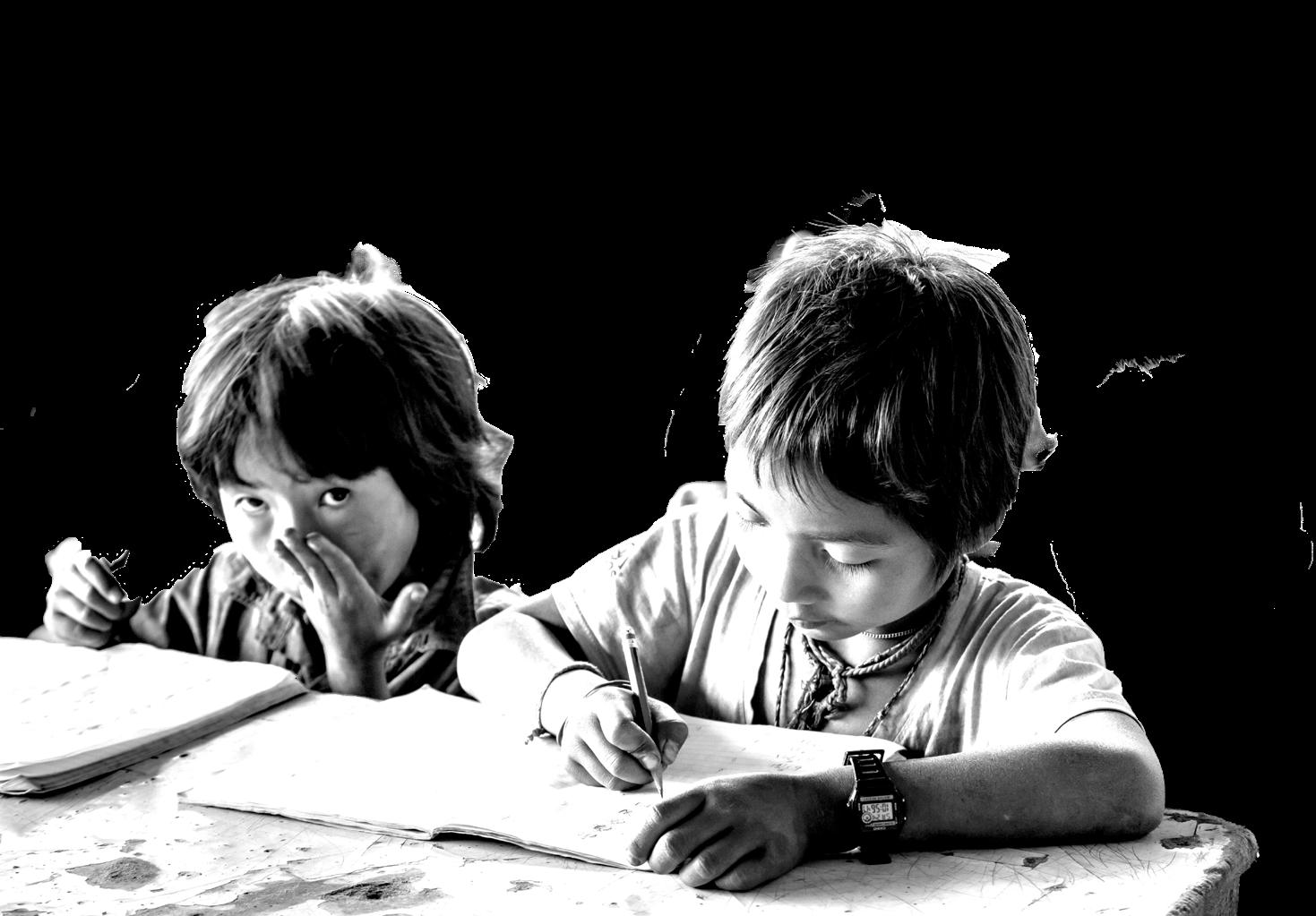
In Myanmar’s Bago Zone, where uncertainty looms due to political unrest and military control, one grandmother clings to hope for a better future for her grandchildren. Daw Tin Nyaunt, a 61-yearold woman who has lived in the community for over five decades, faces daily struggles as the sole caregiver of her two grandsons, aged 10 and 12.
Life has never been easy for Daw Tin Nyaunt. A casual laborer from a very poor family, Daw Tin Nyaunt finds meeting even the most basic needs to be an ongoing challenge. The political crisis in Myanmar only deepened her worries, especially regarding her grandchildren’s education. With schools shut down and the streets growing more dangerous, she feared for their safety and future. The reopening of schools under military control did little to ease her concerns. Sending them back to an environment where military ideologies might influence them was a risk she was unwilling to take.
Then, she heard about the Ebenezer Church of the Nazarene’s church-based tutoring center—a glimmer of hope amid the turmoil. When her grandsons were accepted into the program, relief washed over her. She felt a sense of reassurance for the first time in a long while. The center provided a safe space where they could continue their education, free from fear and instability.
Beyond academics, the tutoring center became a transformative place for her family. The structured learning environment instilled discipline and positive changes in her grandsons’ attitudes. They not only excelled in their studies but also grew to be kinder, more responsible individuals. The center also introduced them to Christian teachings, which initially felt unfamiliar, as they had perceived
Christianity through a lens of religious division. However, through love, care, and the church's genuine support, the boys opened their hearts to new perspectives. They now listen to the Word of God with curiosity and respect, something Daw Tin Nyaunt never imagined would happen.
“The tutoring center has been a blessing to my family,” says Daw Tin Nyaunt. “My grandsons are learning not just academics but also values that make them better people. I no longer feel alone in raising them—I know they have a future.”
The Ebenezer Church of the Nazarene goes beyond education; it nourishes both the body and soul. The tutoring center provides children with meals, ensuring they are learning and receiving the proper nutrition they need to grow. Families, including Daw Tin Nyaunt and her grandsons, have found solace in the church’s unwavering support, knowing they are not alone in their struggles.
For Daw Tin Nyaunt, the tutoring center is more than just a place of learning—it is a sanctuary of hope. She dreams of a future where her grandsons will grow up to be well-educated, compassionate individuals who can break free from the cycle of poverty. She believes that through the center’s guidance, they will gain knowledge and develop the strength and wisdom to navigate life’s challenges.
The impact of the church-based tutoring center in Bago Zone is profound. Education, spiritual guidance, and community support slowly but steadily transform lives. In a country where uncertainty reigns, the church stands as a pillar of stability, offering children and their families a future filled with faith, knowledge, and endless possibilities.


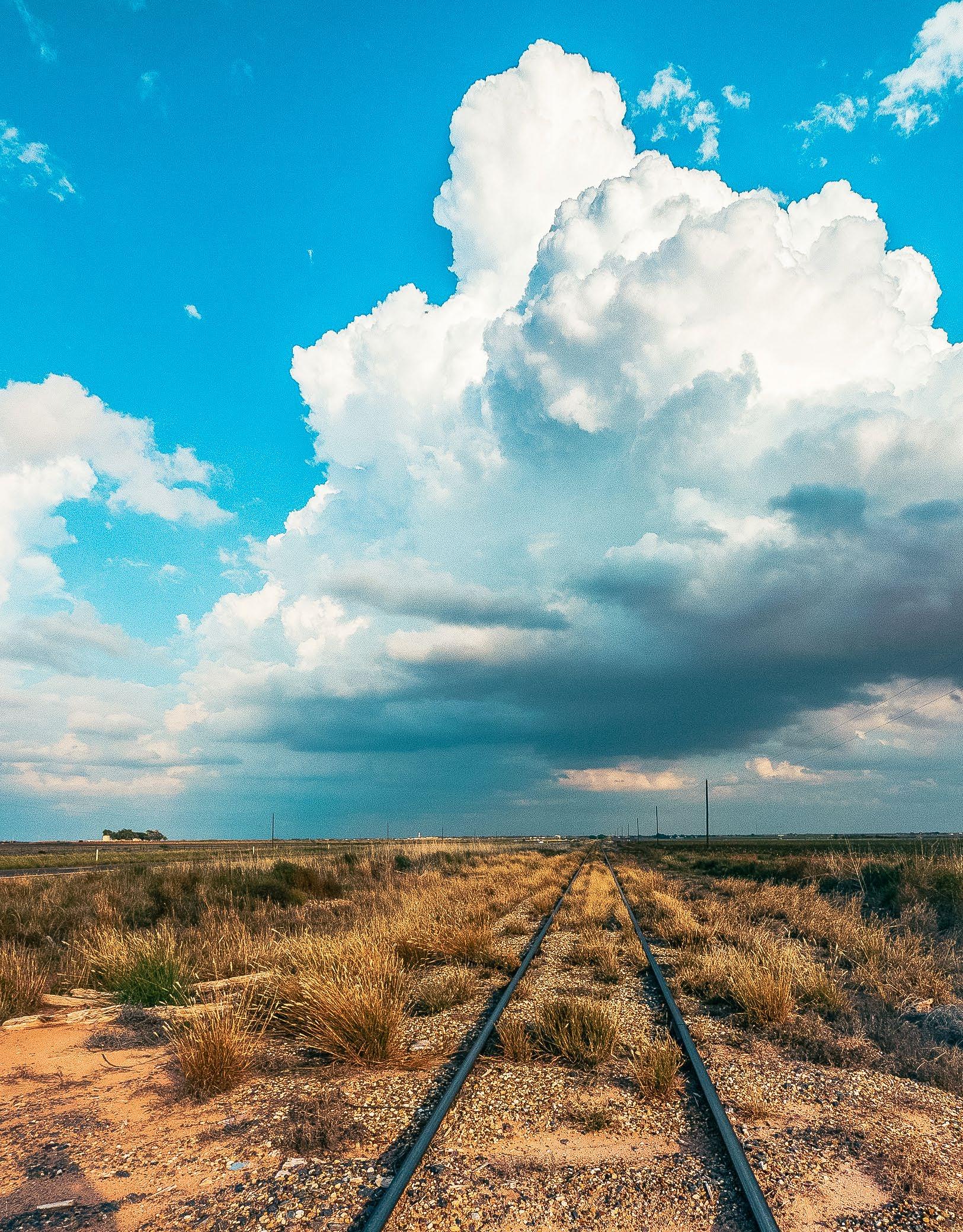
THROUGH
Compassion WORD OF GOD
Teenagers
EVERYDAY COMPASSION
Luke 15 is Jesus’ response to a quiet murmur: “This man eats with the wrong people.” The Pharisees and teachers of the law were troubled by Jesus' choice of dinner companions. In response, Jesus tells three parables: a shepherd who leaves 99 sheep to search for the one that’s lost, a woman who celebrates after finding a lost coin, and a father who runs to welcome home a son who has squandered everything.
These parables flip the script. While the Pharisees are preoccupied with optics and religious appearances—“You’re condoning their behavior,” “You don’t care about holiness”—Jesus is concerned with something deeper: restoration and welcome. Where the Pharisees see categories and behaviors, Jesus sees names, faces, and the potential for transformation. It’s as if Jesus is saying, “Have you even asked their names?”
For the past ten years, I’ve served as the high school pastor at Hermitage Church of the Nazarene just outside Nashville, Tennessee. Each summer, we guide our students into encounters that challenge them to wrestle with what it means to follow Jesus in the real world. These experiences are designed to expose them to people whose lives look nothing like theirs. We want our students to reflect on how they will respond to the Spirit of God through God’s church, participating in God’s mission.
It’s easy to have an opinion on a situation you’ve
never entered. But everything changes when an “issue” becomes a person—with a story and a name.
In the mid-2010s, the refugee crisis in Syria reached a breaking point. Over 4.8 million people were displaced by the civil war. Countries around the world scrambled to offer aid and resettlement. Turkey and Lebanon opened their borders to millions. The United States allowed about 12,500 Syrian refugees to resettle here.
That same year, we learned about the work happening at Cactus Nazarene Ministry Center in Cactus, Texas—a small town with a surprisingly diverse population due to refugee resettlement. We knew we couldn’t solve a global crisis but could choose how we responded. We decided we would not judge others based on political narratives. We wanted to do what Jesus did: sit down at the table, learn names, listen to stories, and honor the dignity of those who had been displaced.
So we loaded up a 56-passenger bus with high school students and drove 18 hours to Cactus, TX.
On the way there, I addressed the elephant in the room. I told our students plainly: “We’re heading into a town filled with people from all over the world—South America, South Asia, Africa. You’re about to be in the most diverse place you’ve ever experienced. You’re here to serve, yes—but more than that, you’re here to listen.”
I challenged them: When you’re at a restaurant, a worksite, or in someone’s home, take a risk.

ASK A QUESTION. GET CURIOUS. SAY:
» Can I ask you your story?
» What was your childhood like?
» Do you like it here? Do you hope to return home?
» What brought you here?
» What has your experience in America been like?
I asked them to listen closely and assume the posture of a learner. I told them to write down what they heard—on paper, on their phones, anywhere—because these were stories worth remembering. These weren’t statistics or policies—these were people.
Each evening, we debriefed as a group. I’d ask, “Whose story did you learn today?” Sometimes, it was a 13-year-old girl from Myanmar. Other times, it was a 30-year-old man from Haiti or a father from Somalia. The students leaned in, shared what they had heard, and reflected. And in those stories, something shifted.
What had been a “hot topic” political issue started to feel more like a theological one. How do we treat those caught in the middle of political, cultural, or religious tension? Do we hold them at arm’s length like the Pharisees did? Or do we pull up a chair, learn their name, and listen—like Jesus did?
We chose to listen, to be present, or to be compassionate. Perhaps God used those moments to grow compassion in us.
Compassion doesn’t usually erupt out of nowhere. It grows—slowly, intentionally—when we create space to encounter someone else’s humanity. When our students listened to the stories of people who had fled violence or persecution, something softened. They weren’t forming opinions from the sidelines anymore; they were engaging in relationships.
The students didn’t return from Cactus with easy answers or political talking points. They came home with names and stories. They came back more aware of the sacred dignity each person carries, more awake to Jesus' call to love without agenda.
In a world filled with noise, fear, and division, it’s easy to become numb. But when we ask, “Can you tell me your story?”—walls come down. Hearts open. Compassion has a chance to grow.
Media, politics, and social pressures shape our young people every day. The church has an opportunity, even a responsibility, to help shape that formation by inviting students into spaces where they see the humanity of their neighbors, where they can ask questions, listen closely, and experience the transforming love of Jesus in real-time.
It might start with one simple question: “Can you tell me your story?”
Hunter Steinmetz
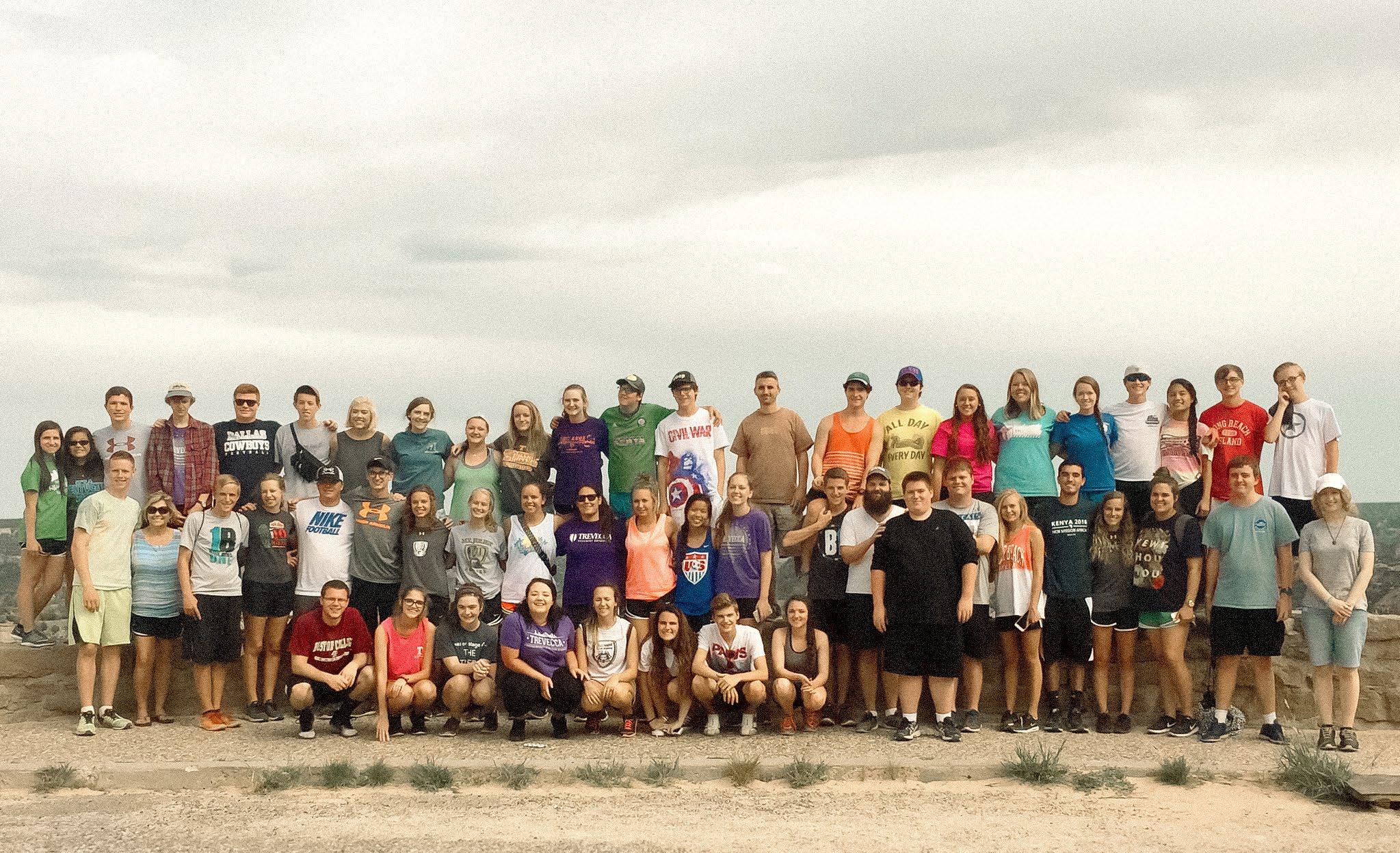
FOR DISCIPLESHIP RESOURCES geared towards compassion rooted in relationships, visit The Foundry Publishing >
Youth Pastor Hermitage Church of the Nazarene


QUESTIONS & ANSWERS WHAT DOES IT MEAN TO LIVE OUT COMPASSION DAILY?
“The heart of compassion is creativity: to see and believe that the Kingdom is breaking into our world even when circumstances sometimes suggest the opposite. Keep seeing and living with creative Kingdom vision.”
- Pastor Luke Carrig, Pastor at Greystones Church of the Nazarene
Peter integrates messages of stewardship and justice into his sermons. He reminds his congregation that clean water is not just a health issue but a kingdom value—caring for God’s creation and one another. He organizes WASH project donations for widows and visits the elderly to ensure their latrines are usable.
“God is not only worshiped in our singing, but also in the dignity we give when we dig a pit latrine for a neighbor.”
- Peter, Pastor and WASH advocate in Kenya
Mary walks from homestead to homestead, educating families about hand-washing and safe water storage. She carries soap and tippy-tap materials in her bag, not just to demonstrate, but to gift families who cannot afford them. She prays with families, especially those who have lost children to waterborne diseases, reminding them that God sees their pain and walks with them.
“To love like Jesus is to kneel by a sick child’s bedside and still return tomorrow.”
- Mary, community health volunteer in Kenya
“Compassion lived out in our daily walk begins with our encounter with God daily through Jesus, and this encounter transforms us to capture God’s heart for the least, the lost, and the last among us. This transformation could simply look like a gentle smile, kind words, and a humble act of service to a random stranger we meet on the road. Being present to offer comfort to those who grieve… standing and speaking up for those who can’t speak for themselves in matters of truth and justice. To cry, lament to God for the suffering of the world, nevertheless hoping in the redemption and the coming of God to dwell among us here and now and in the days to come.”
- Dan Balayo, Asia Pacific Holistic Child Development Coordinator


EVERY CHILD MATTERS
Through Child Sponsorship, you can help provide a child with essentials like food, education, and medical care—all through the local church.

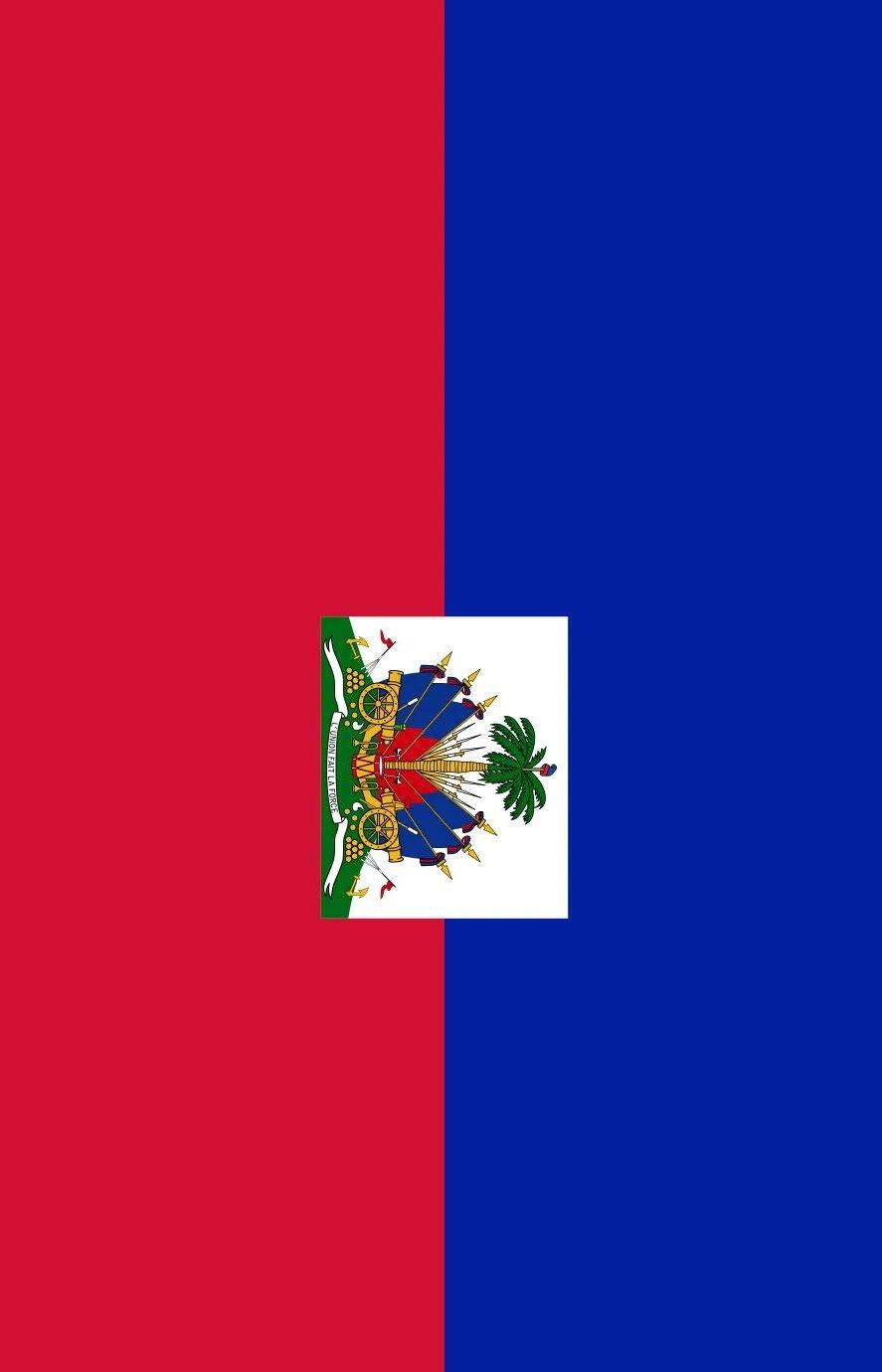
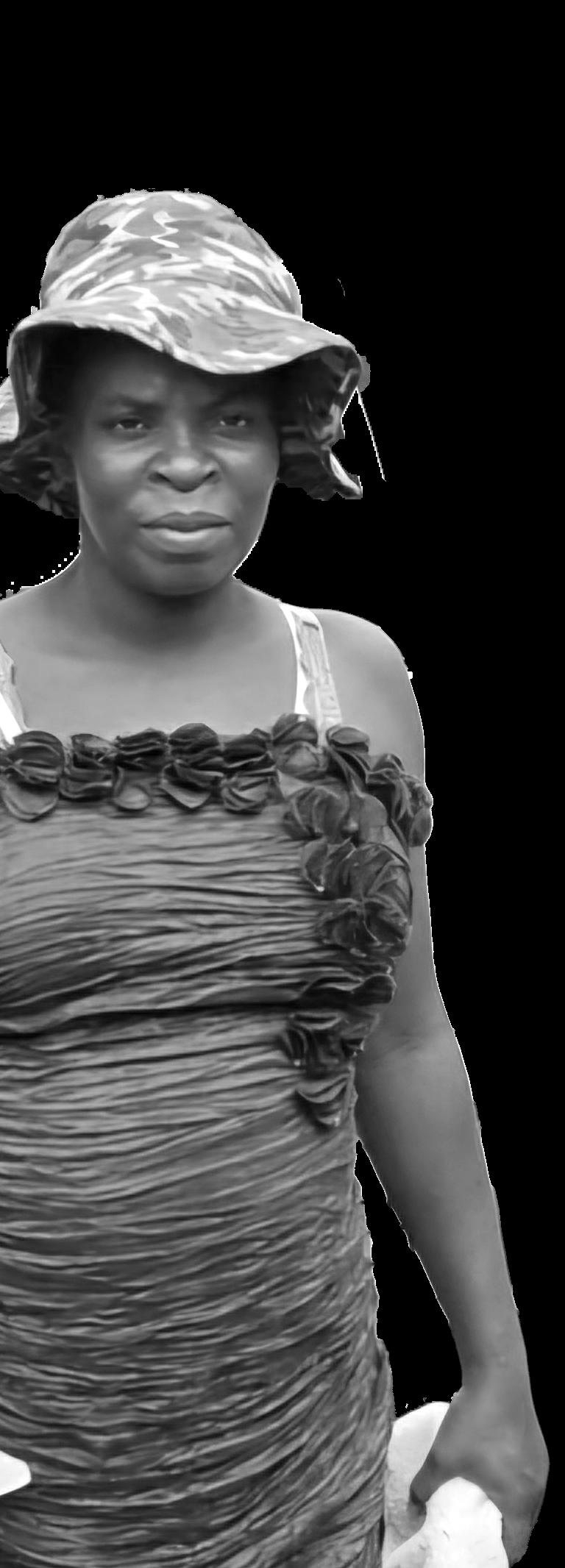
STANDING in the GAP:
Praying for Haiti
By Ephraim Lindor, NCM Haiti
Haiti is experiencing one of the most prolonged gangrelated crises in its history as a nation. A coalition of nine gangs has taken control of large parts of the country, leading to widespread violence and instability. As a result, peaceful citizens are suffering — the most affected parts being the western region of the country, the capital, and Artibonite.
Thousands of people have been displaced in the Portau-Prince area as gangs continue to seize territories through looting and violence. The ongoing conflict has forced the closure of the main international airport in Port-au-Prince for more than four months following attacks on commercial airlines.
Gang violence, combined with extreme weather events, has led the closure of several Nazarene churches, and their congregations have been scattered into small groups. However, amid the crisis, this dispersion has also created new opportunities for evangelism.
Despite the long crisis, NCM Haiti is coming alongside churches to care for their neighbors. They have distributed food, seeds, and banana plants. Even in the midst of chaos and tragedy, NCM is working across several districts. Last month, more than 100 new people joined the worship services at the El-Shaddai Church of the Nazarene.
Would you commit to praying for Haiti and the churches that are serving faithfully there?

Gracious loving God,
You are the source of peace, justice, and hope in a world filled with suffering. Today, we lift up Haiti, a nation in crisis, where violence and instability have displaced millions, leaving families in fear and communities in turmoil. Lord, we cry out for your peace and healing to reign. We pray for stability and security.
Lord, strengthen your church in Haiti. May the scattered congregants become messengers of hope and salvation. May your gospel spread, lives be changed, and communities be renewed by your grace. Equip the Church of the Nazarene and all who labor in your name with courage, wisdom, and compassion as they serve those in need.
We pray for the most vulnerable —the children, the elderly, the displaced, and those who live in constant fear. Be their refuge and strength. Provide food for the hungry, shelter for the homeless, and protection for those who are most at risk. Raise up compassionate hands to serve them, and may your love be made known through acts of kindness and mercy.
We trust in your faithfulness, Lord. Let the people of Haiti know that you have not forgotten them. We believe that through your grace, transformation is possible. May your kingdom come, and your will be done in Haiti, as it is in heaven.




OuT oF tHe AsHeS:
Nazarene Churches Respond with Hope After California Wildfres
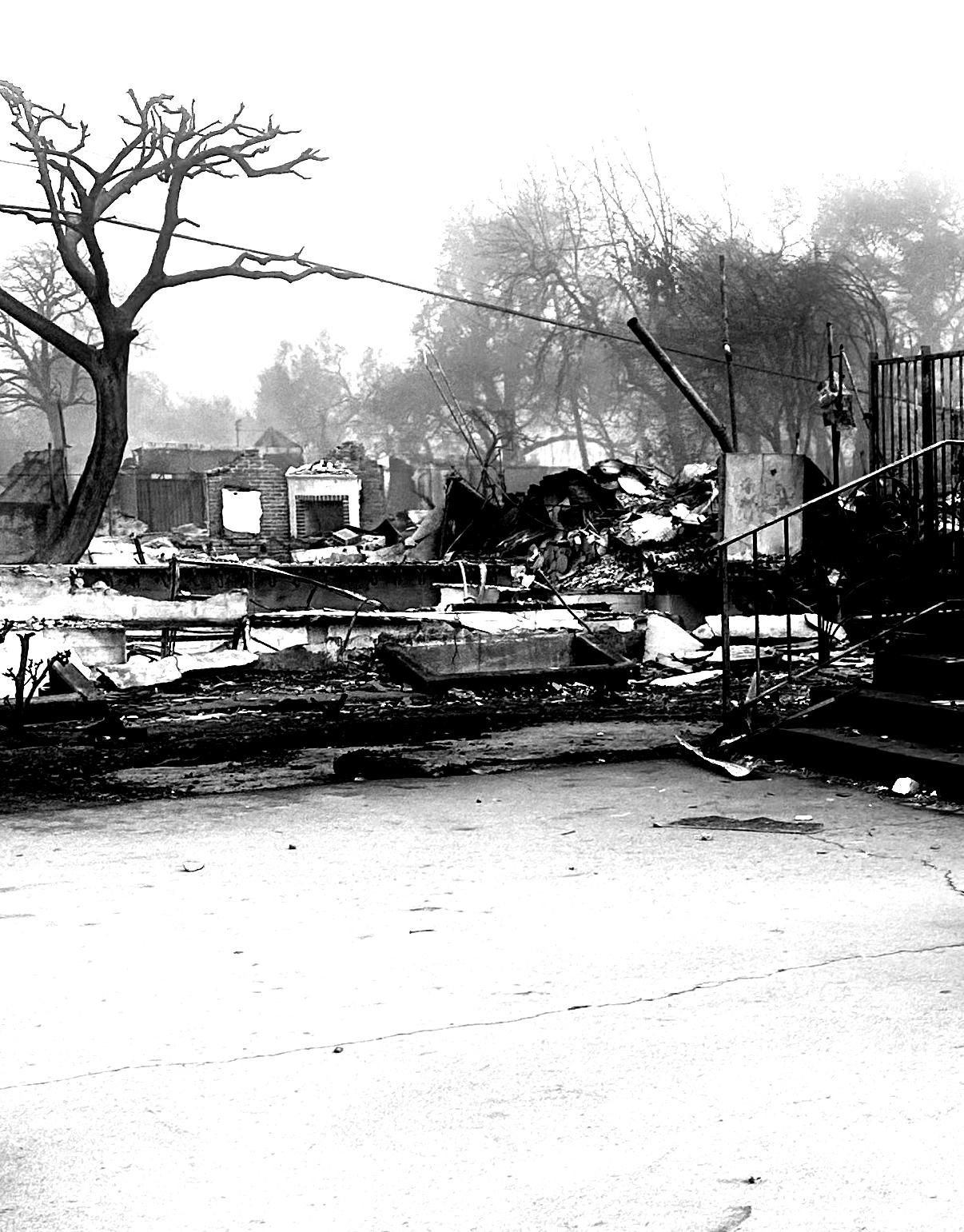
In January 2025, large and devastating wildfires swept through parts of Southern California. The two largest blazes, the Palisades and Eaton fires, collectively burned 37,728 acres and destroyed more than 16,000 homes and other buildings. Close to 200,000 people were evacuated from their homes. The Eaton fire directly impacted the cities of Pasadena and Altadena, home to several Nazarene churches. Out of the ashes, stories of hope and healing continue to emerge from communities of faith.
Story by Amy Heckman and Jonathan-Aubrie Lewis
Photos provided by local churches
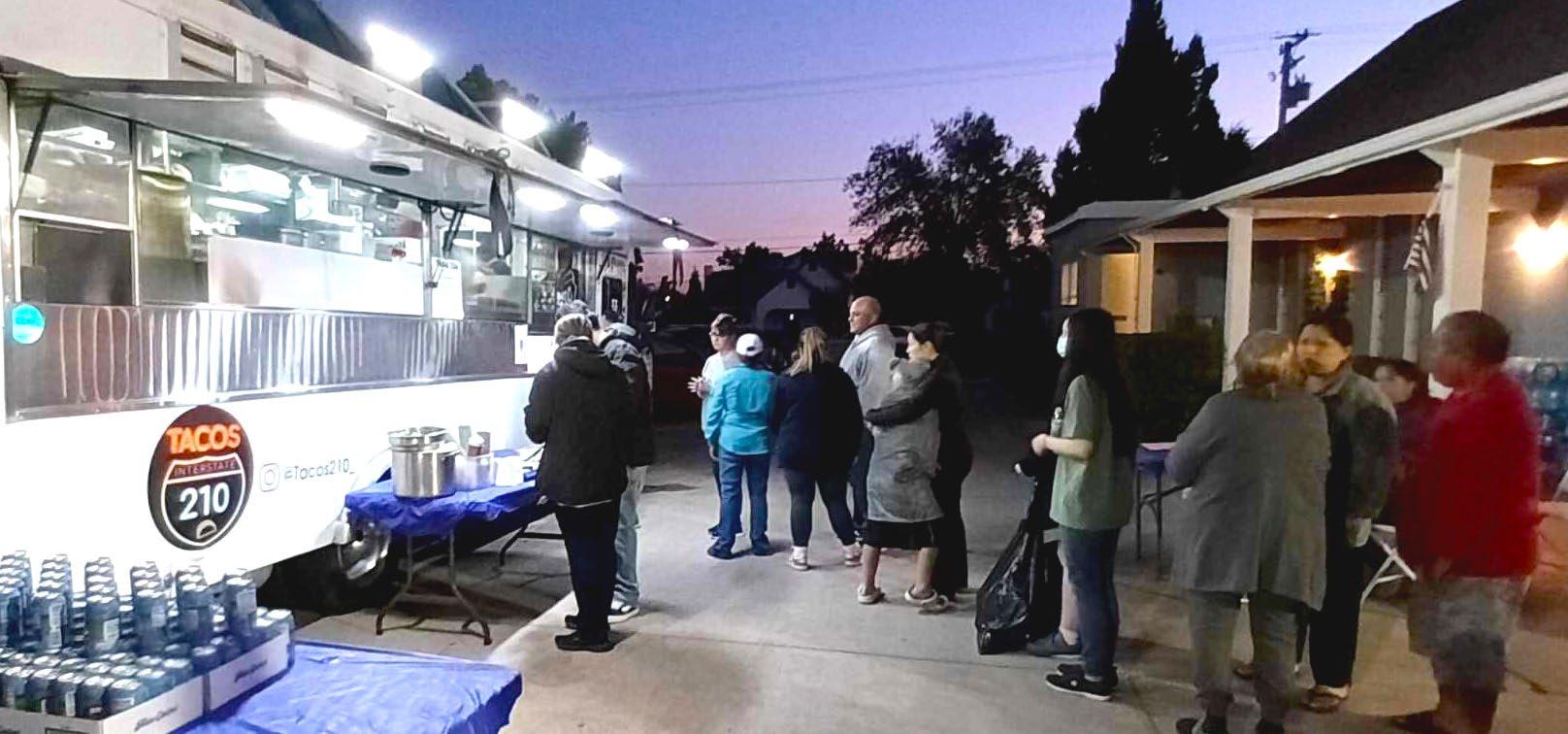
PASADENA
When the fires swept through their community, the congregation at Iglesia del Nazareno Pasadena quickly sprang into action. The church's location, just a short distance from Altadena, made it ideal for offering aid, especially to the local Spanish-speaking community.
“They’ve been working really hard,” said Rev. Humberto Mena, superintendent of the Western Latin American District.
Pastor Jose Cervantes and the church leadership team opened their campus to provide food for anyone in need. Very quickly, they found themselves serving more than 350 meals each day.
Some of these meals are prepared by church volunteers, while others are provided through partnerships with World Central Kitchen and Thrive Together, a local nonprofit organization. The
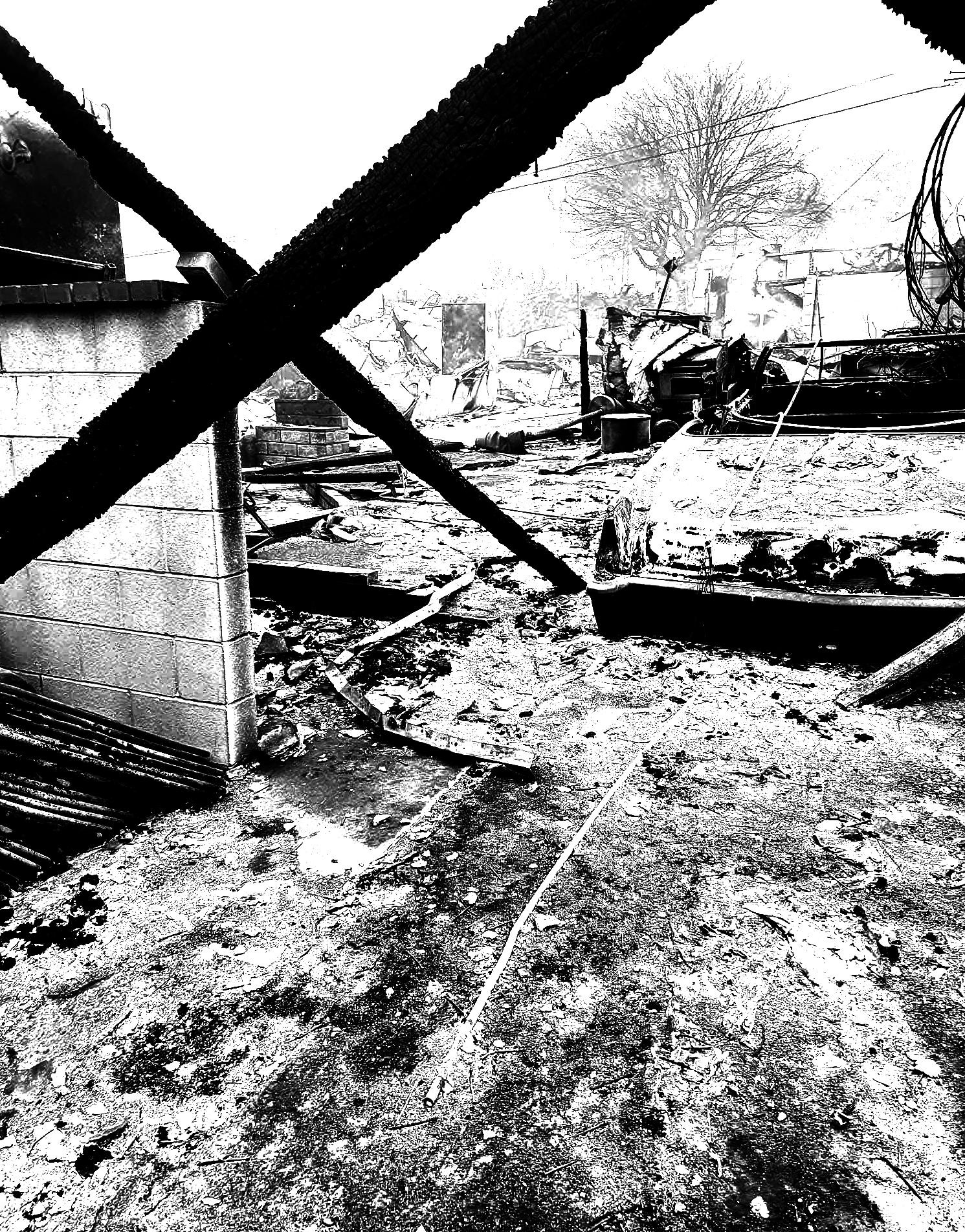
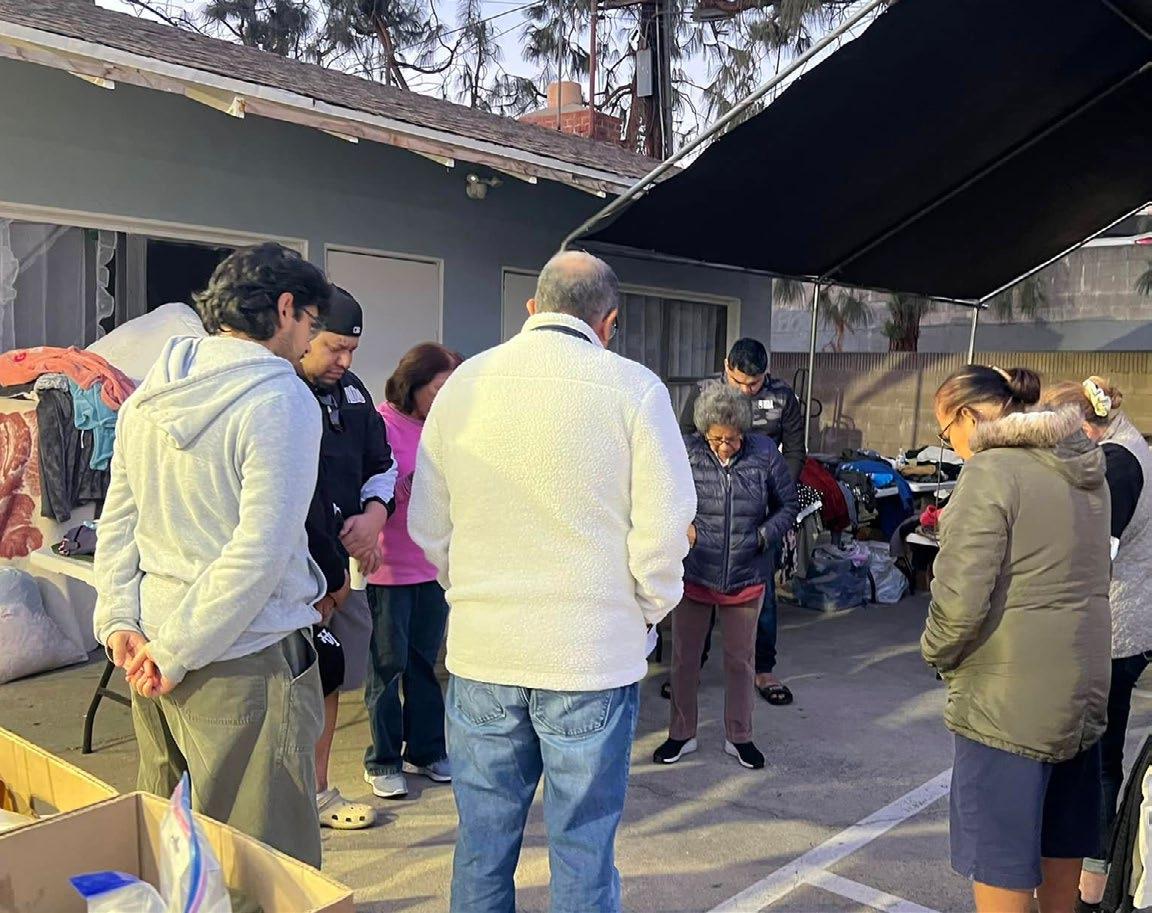
congregation brought in cots and mattresses, and up to 26 evacuees at a time found temporary shelter in the church building after losing their homes.
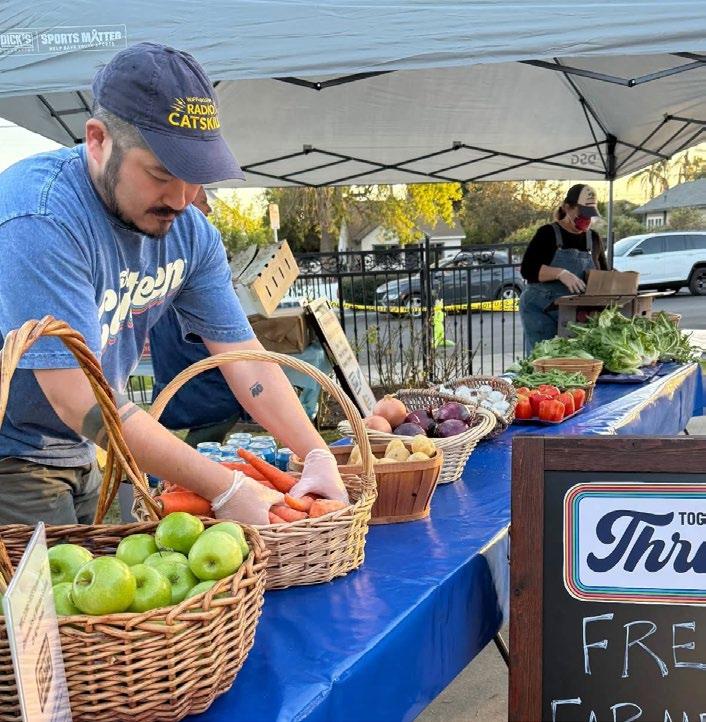
Volunteers have sorted and distributed clothing along with school supplies for children in the neighborhood.
“[They are] doing really good things for the community,” Mena said. “They’ve been really faithful.”
Across the Western Latin American District, five families, including two pastoral families, lost their homes in the Eaton Fire. For these and many others, recovery is just beginning—and so the relief work continues. As of late February, nearly 300 people received daily meals through the church’s efforts, supported by ongoing community donations and nonprofit partnerships.
“This is going to be a long-term thing,” Mena said. “We want to do the best that we can.”
In addition to the compassionate care provided by Iglesia del Nazareno, Pasadena First Church of the Nazarene has also reached out to care for its neighbors. Through the church’s regular foodbank ministry, the congregation is committed to walking alongside their community as it heals—opening their facility as a weekday co-working site for people who work from home, running a disaster support group, and raising funds for relief.
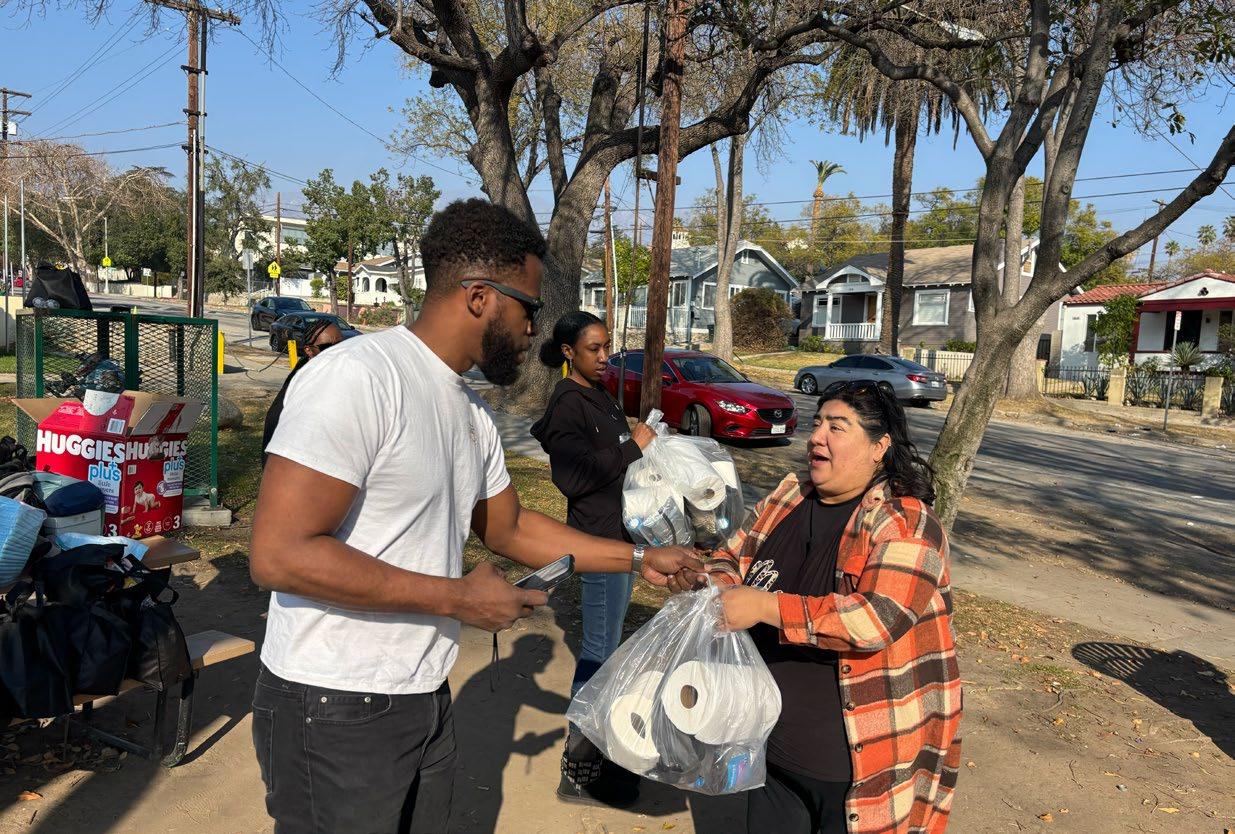
ALTADENA
The Eaton fire quickly consumed thousands of structures in its path, including the historic Fountain of Life Church of the Nazarene in Altadena. Pastor Jonathan A. Lewis and his wife, Dr. Sandra Lewis, have shepherded this community for more than 30 years.
Their son, Jonathan-Aubrie Lewis, reflected on what the city of Altadena means to his family and their church community.
“Altadena was and is special because it was the first city that allowed Black people to purchase homes in California,” he explained. “Nestled at the foothills of the San Gabriel Mountains, Altadena is a quaint city with a smalltown western feel to it. It became a safe haven, a beacon of hope, and yes, a promised land for Black people to build generational wealth.”
Indeed, as of 2023, 81 percent of black residents in Altadena owned their homes— nearly double the national average.
For the Lewis family, settling in Altadena led to decades of embodying their Christian faith by serving in various ministries. In the early 1990s, Jonathan and Sandra started Fountain of Life Church in their living room. They opened a food bank and clothing ministry, a Christmas toy drive, and a ministry for men, women, and children.
“Both of my parents grew up and experienced poverty, so they understand what it means to struggle,” Jonathan-Aubrie said. “[This] makes them uniquely qualified to serve the west side of Altadena, which is predominantly African-American.”
As the church grew, the members decided to join the Nazarene denomination, merging with another local church. They continued to serve those with both material and spiritual needs. For the Fountain of Life
congregation, Altadena is rich in both its history and hope for the future, and the fire hasn’t changed that.
“We have our hands on the pulse and heartbeat of this community,” Jonathan-Aubrie said.
WHAT COMES NEXT?
“The good news is that our Fountain of Life Church is already planning on getting back to the community, and the rebuilding process has begun,” said Los Angeles District Superintendent Mark Lehman.
In the meantime, the congregation has made a temporary home at the Bresee Campus of Montrose Church of the Nazarene
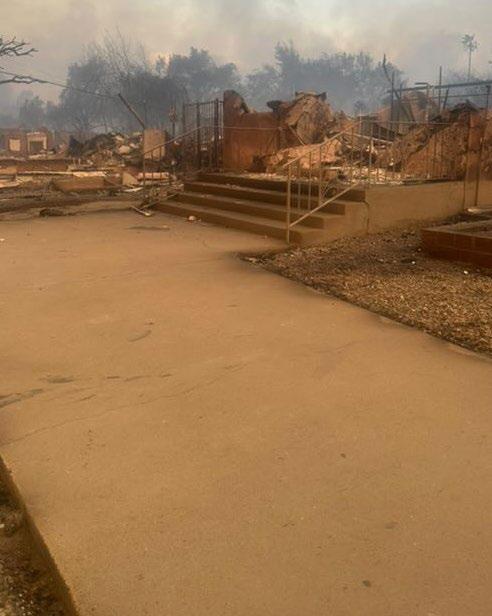
In
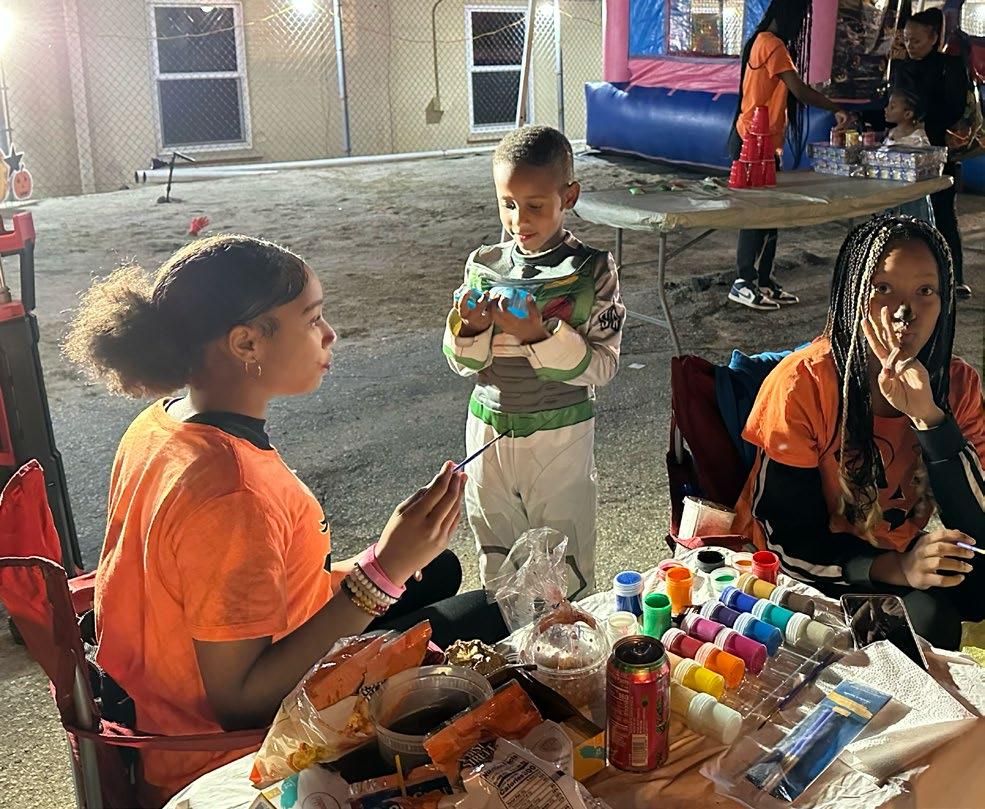
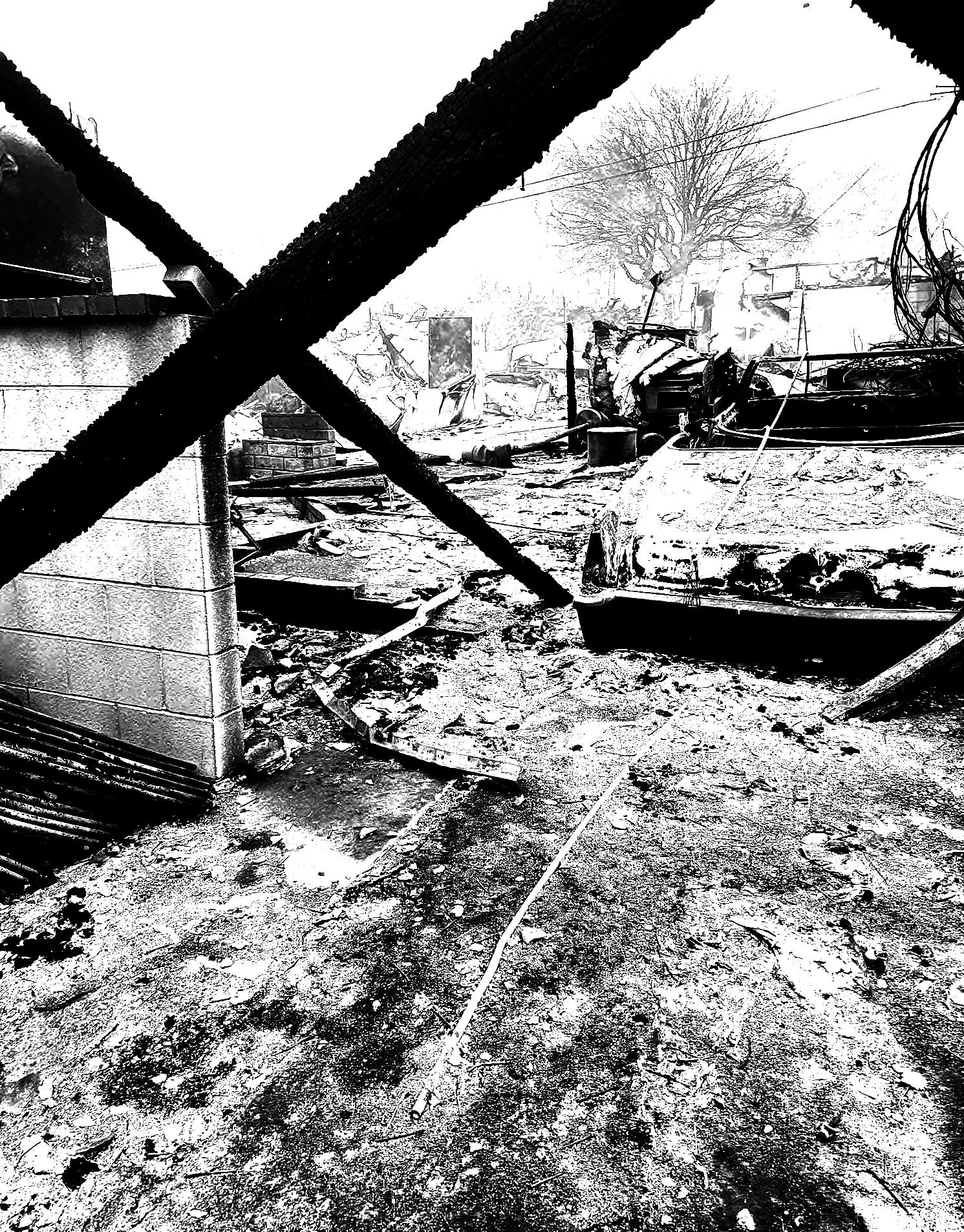
in nearby Pasadena, and they’ve organized distributions of clothing, food, and gift cards.
“Where do we go from here? We continue doing what God has always mandated of us,” Jonathan-Aubrie shared. “We continue to serve our community—even more now.”
the aftermath of the fres, churches provided stability and safety to those hit hardest.
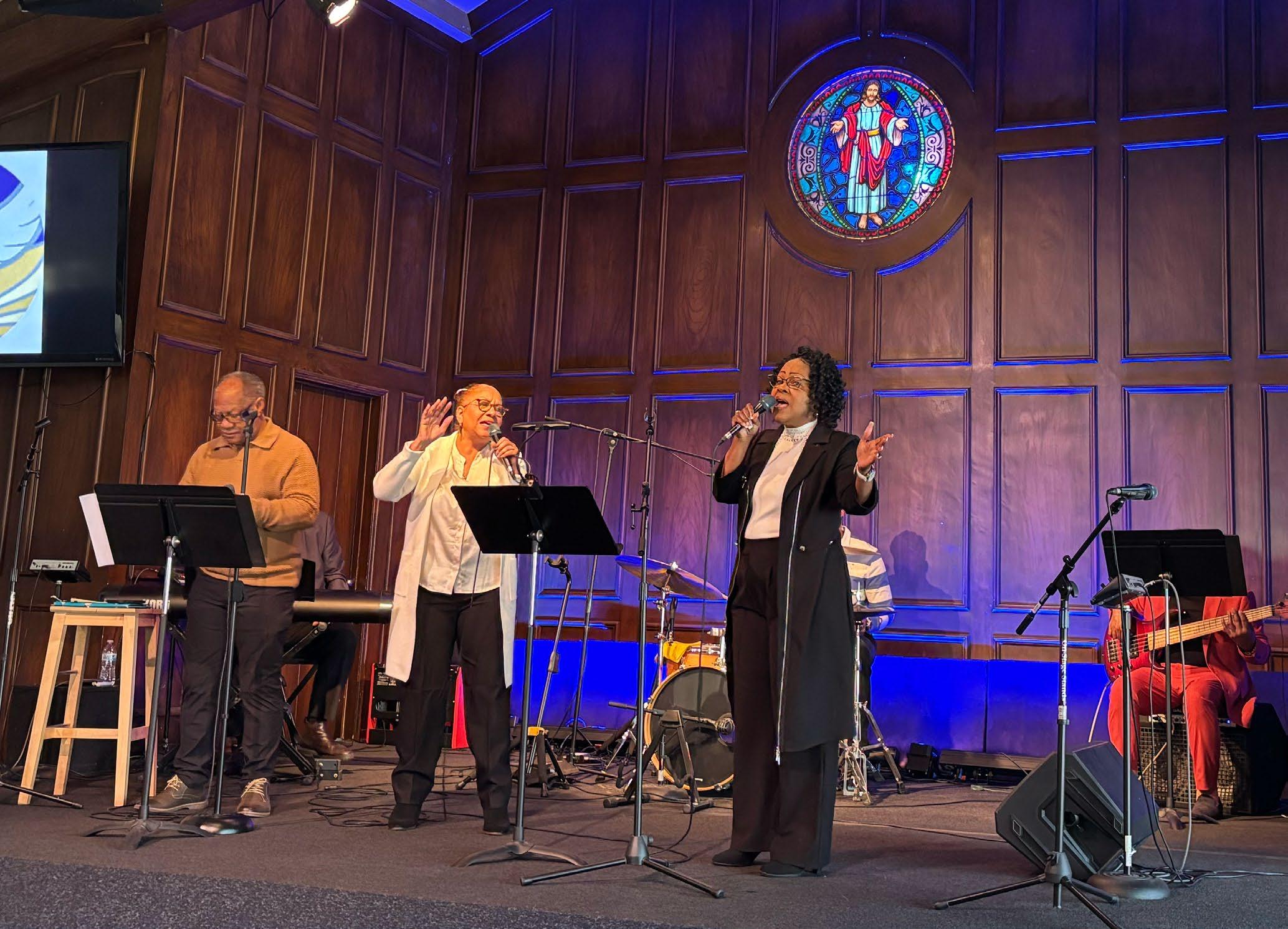
Across the Los Angeles District, at least 50 families lost their homes, and many more were displaced. Donations poured into the district from across the country, and countless gift cards were placed in the hands of displaced families. Support from donors who gave through Nazarene Compassionate Ministries also bolstered the response in the area.
“With the cash donations received, we have established a relief fund to give financial assistance to people who have not just lost their homes but to those whose livelihoods have been severely impacted,” said Dr. Lehman. “We are so grateful for the generosity of people and churches from across the country.”
“God has been good, and he’s providing still today.” - Rev. Mena
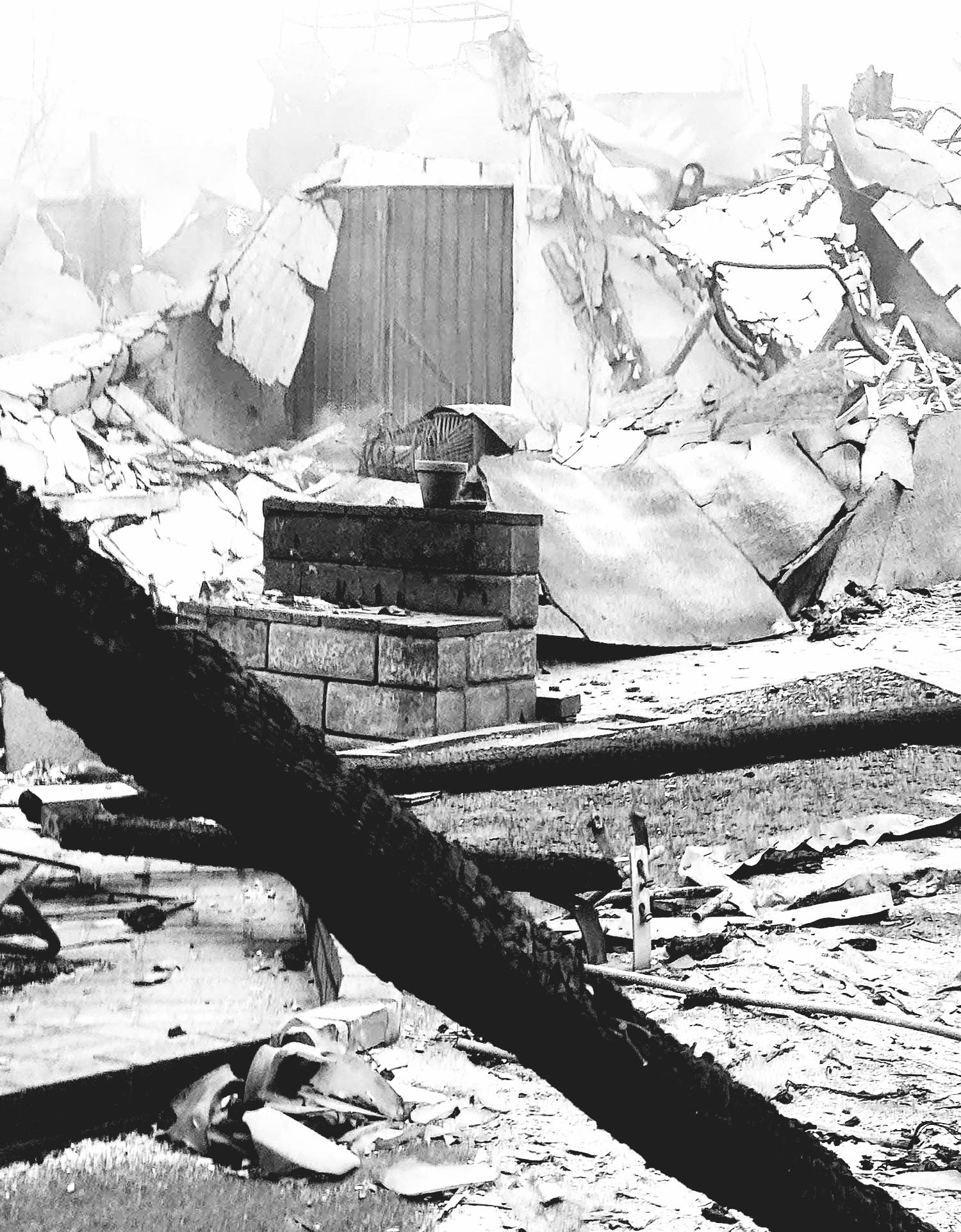
About the Eaton fire and its impact in Altadena
After the fres, the Church gathers in worship—proclaiming hope, healing, and the promise of new beginnings.
FAITH UNSHAKEN:
A Church Reborn from the Taal Eruption
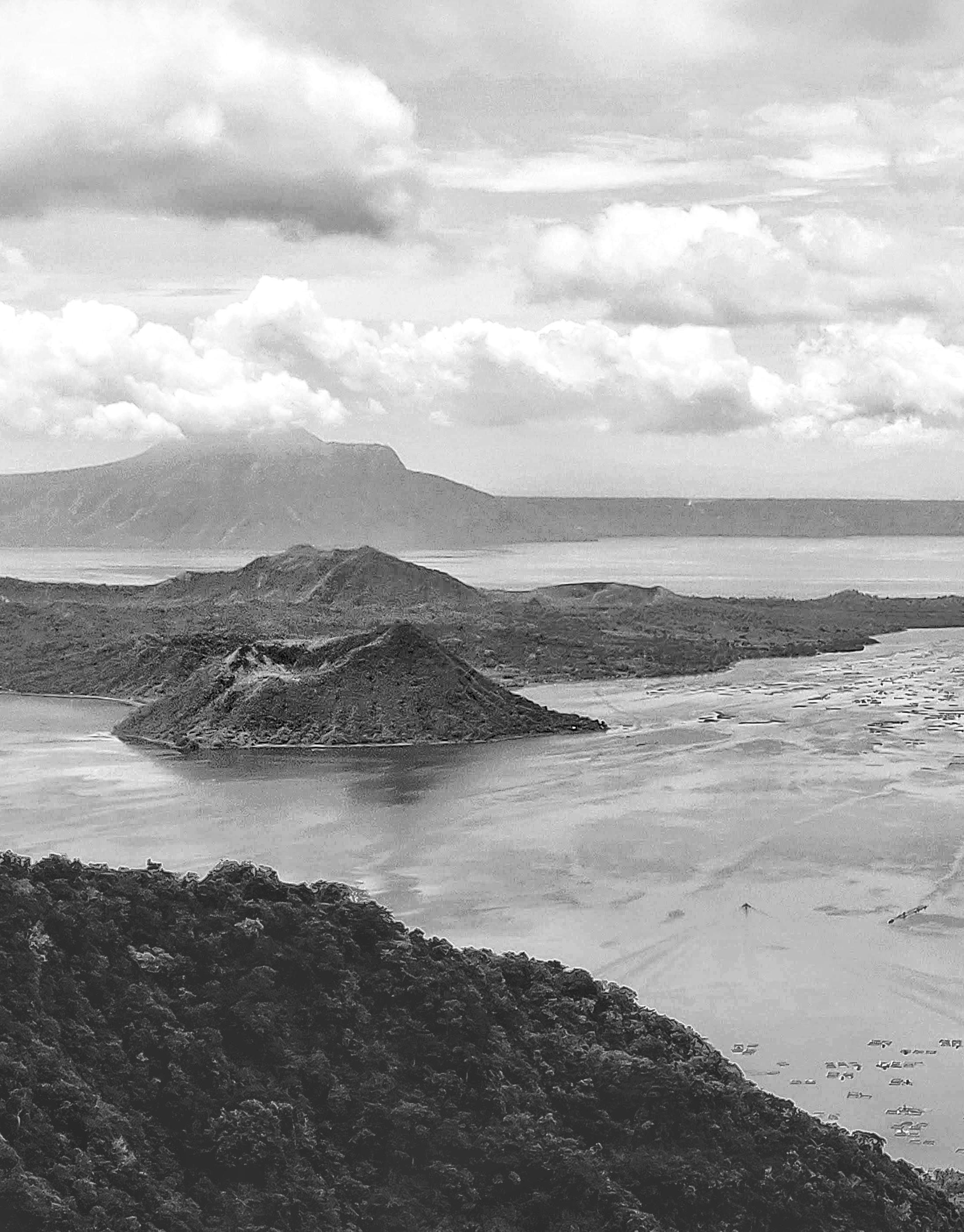
January 12, 2020, would forever be etched in the memories of the residents of Batangas province in the Philippines. Taal Volcano, a picturesque natural wonder surrounded by a serene lake and a favorite tourist attraction, transformed from a tranquil beauty into a source of unimaginable destruction. The volcano, known for its deceptive calm, had been silently building pressure. And on that fateful day, it erupted with brutal force.
The eruption sent massive plumes of ash and smoke into the sky, blanketing the surrounding areas in a thick layer of volcanic ash.
"We were up there, it was so dark. There was thunder, lightning, and earthquakes," recalled one resident, describing the terrifying moments as nature unleashed its fury. Panic set in as families fled their homes, desperate to escape the suffocating ashfall. "As we walked, we were chased by dust and volcanic ash. We smelled of sulfur as we walked from Payapa to Tagaytay,"
another survivor recounted, painting a harrowing picture of their escape.
More than 316,000 individuals were affected by the violent outburst, but the 21,954 families living within the governmentdesignated permanent danger zone bore the brunt of the catastrophe. Their homes, covered in ash, were damaged, and their lives were turned upside down. In the aftermath, many faced uncertainty, not knowing what lay ahead. "We did not know where to go, whether our children would be okay or if they could continue with their
studies. We were always worried if we would have a place to return to after what happened," shared another affected resident.
FROM RUINS TO RENEWAL
The Southern Tagalog District Church of the Nazarene sprang into action in the wake of the disaster. The response effort was made possible by the resources provided by Nazarene Compassionate Ministries. The relief efforts were multifaceted, aiming to address the immediate and long-term needs of the affected communities.
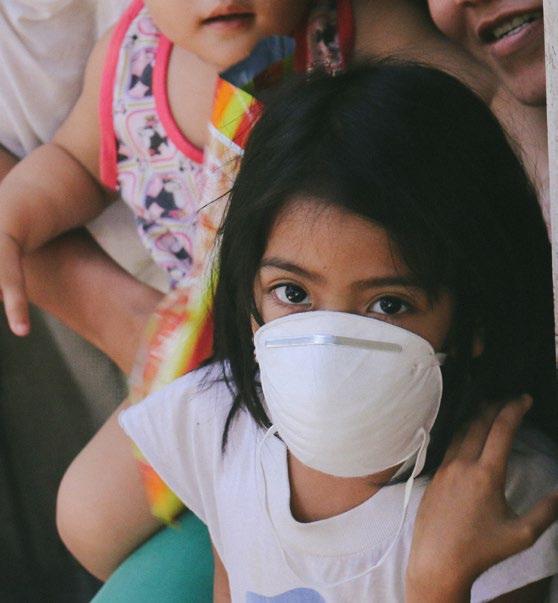
During this time of struggle, hope arrived in the form of people who genuinely cared. "We got to know the Church of the Nazarene,” said one community member. “They visited us and came to our homes, which were completely destroyed during that time. They prayed for us during their first visit. On their second visit, they brought relief goods, including notebooks for school. Then they even cooked for us when they visited us again. They gave us roofing sheets, and by the grace of God, with their help and the help of others, we were able to come back and recover our community here in Barangay Banyaga."
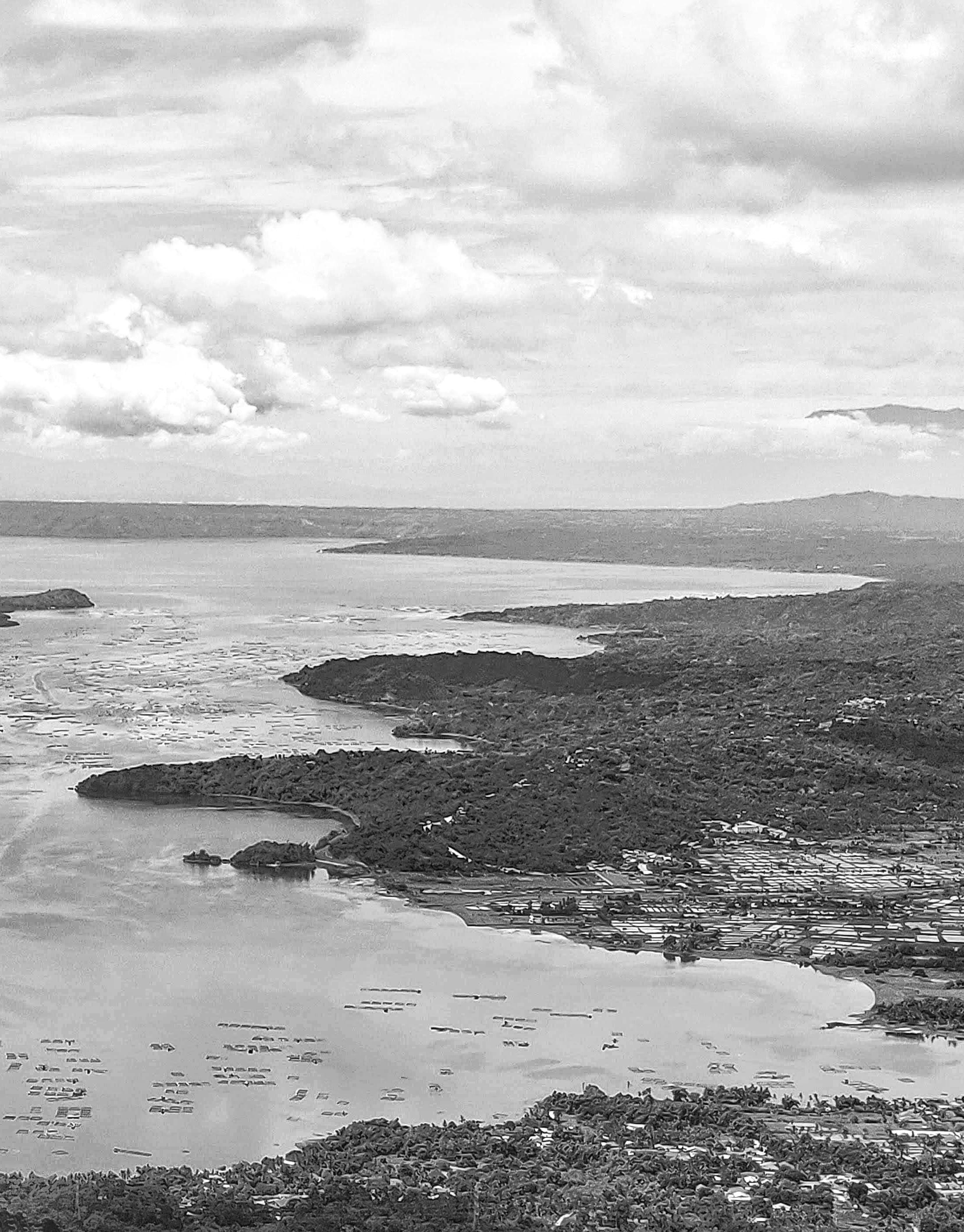
relationships were forged, and a sense of community was rebuilt.
Amid the ongoing relief efforts, a missions team was formed. This dedicated group of individuals visited the affected communities weekly, offering support, comfort, and hope. The presence of the missions team’s members was a beacon of light in the darkness, and their efforts began to yield fruit in the form of strengthened bonds and a renewed sense of purpose among the residents.
A CHURCH REBORN
The culmination of these tireless efforts reached a turning point in December 2024.
On December 8, the Church of the Nazarene in Banyaga, Agoncillo, was officially organized. The church symbolized resilience, faith, and the indomitable human spirit. Rev. Jun Joseph Macas, the district superintendent, conducted the official organization of the church, with Rev. Cedric Levi Cuanang serving as the senior pastor and Rev. Aljon Requiero as the associate pastor. The journey to this momentous day was not
“They visited us and came to our homes, which were completely destroyed during that time. They prayed for us during their frst visit. On their second visit, they brought relief goods, including notebooks for school. Then they even cooked for us when they visited us again. They gave us roofng sheets, and by the grace of God, with their help and the help of others, we were able to come back here and recover our community here in Barangay Banyaga.”
The response was comprehensive, encompassing cleanup campaigns to remove the ash that had settled like a suffocating blanket over the land. Crisis care kits and food items were distributed to ensure that the basic needs of the affected families were met. Building materials were provided to repair the damaged houses, offering a glimmer of hope amid the devastation. These efforts were carried out over the span of a year. During this time,
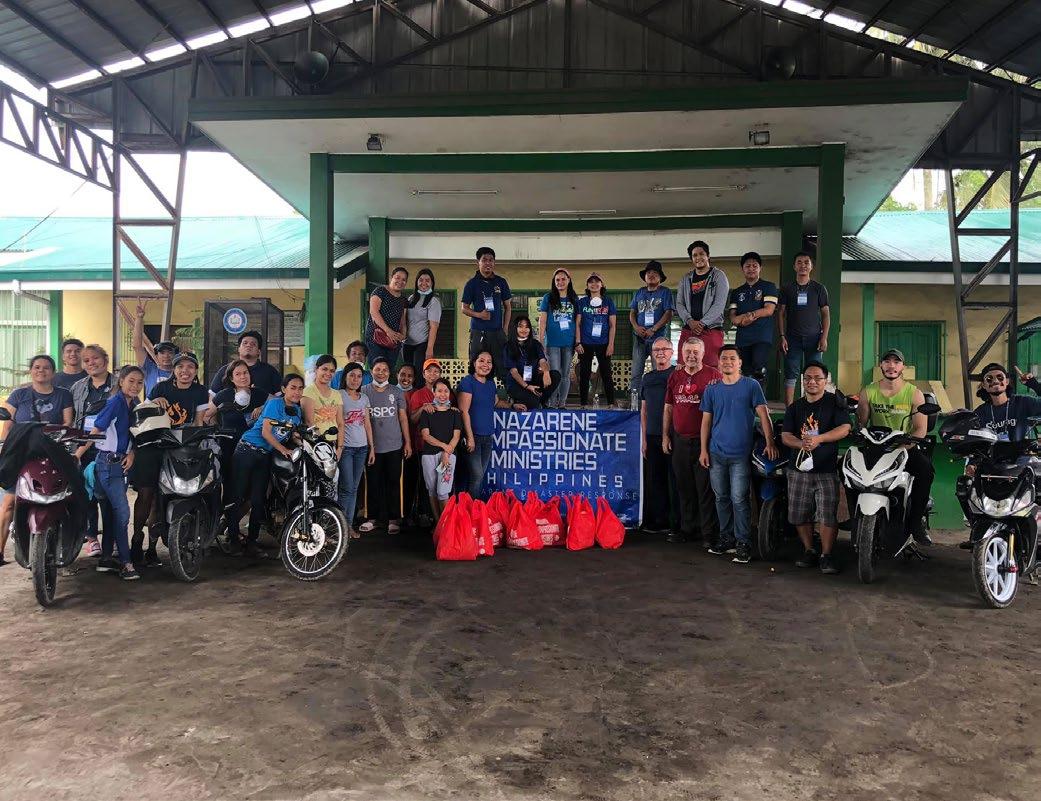
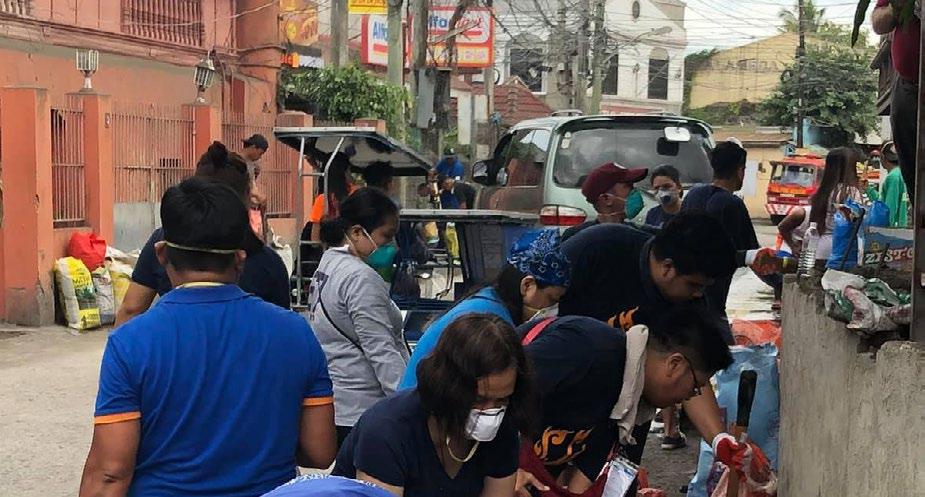
easy. It was marked by countless challenges, setbacks, and moments of doubt. Yet, through it all, the community remained steadfast, drawing strength from their faith and each other. The church that emerged from the volcanic ashes was more than just a building; it was a testament to the power of hope and the unyielding spirit of the people who refused to be defeated by adversity.
The story of this church is one of transformation and renewal. It is a story of how a community came together in the face of disaster, rebuilt their lives brick by brick, and found solace and strength in their faith. The church stands as a beacon of hope, a reminder that even in the darkest of times, there is always the promise of a new beginning.
Today, the Church of the Nazarene in Banyaga, Agoncillo, continues to serve as a pillar of the community. It provides
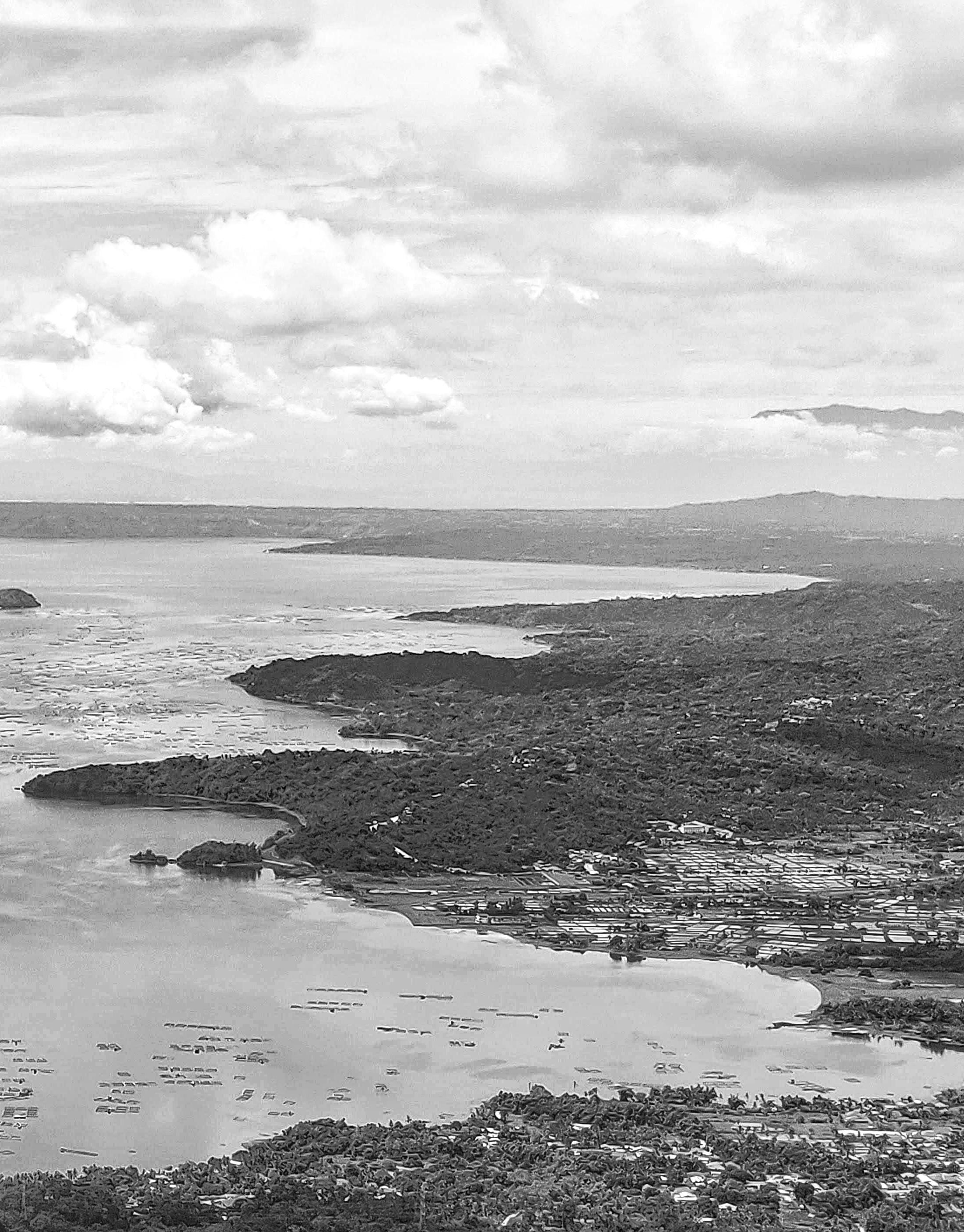
spiritual guidance, support, and a sense of belonging to all who walk through its doors. The church's outreach programs and community initiatives have become a source of inspiration, fostering a spirit of unity and compassion that extends far beyond its walls.
As the sun sets over the tranquil lake surrounding Taal Volcano, the church stands tall, a symbol of resilience and hope. To this day, the journey from the ashes has been remarkable, and the story of this church serves a powerful reminder that even in the face of the most daunting challenges, the human spirit can rise, rebuild, and flourish.
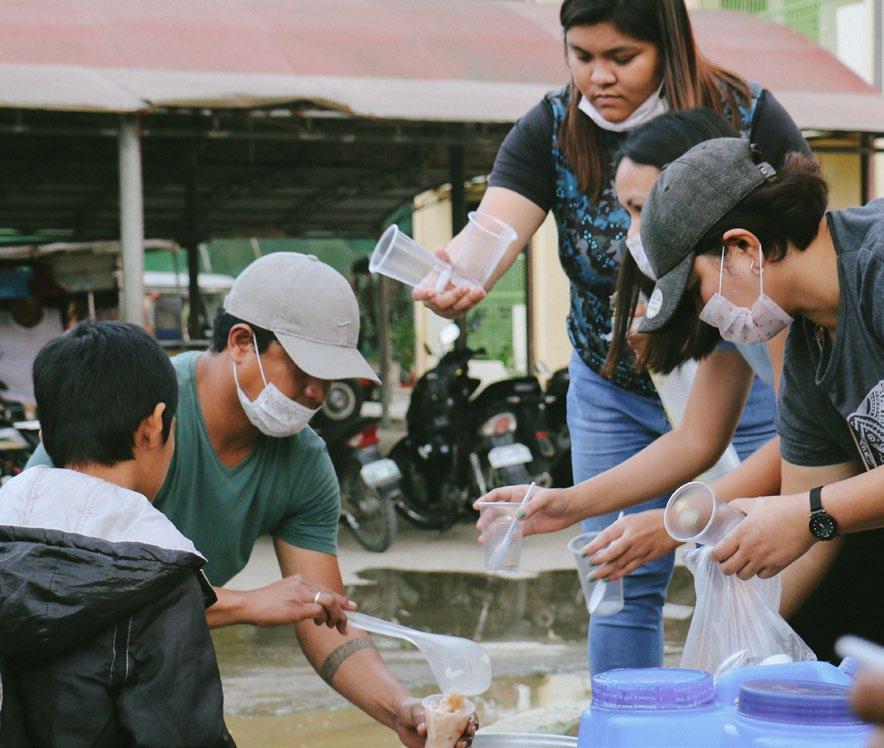
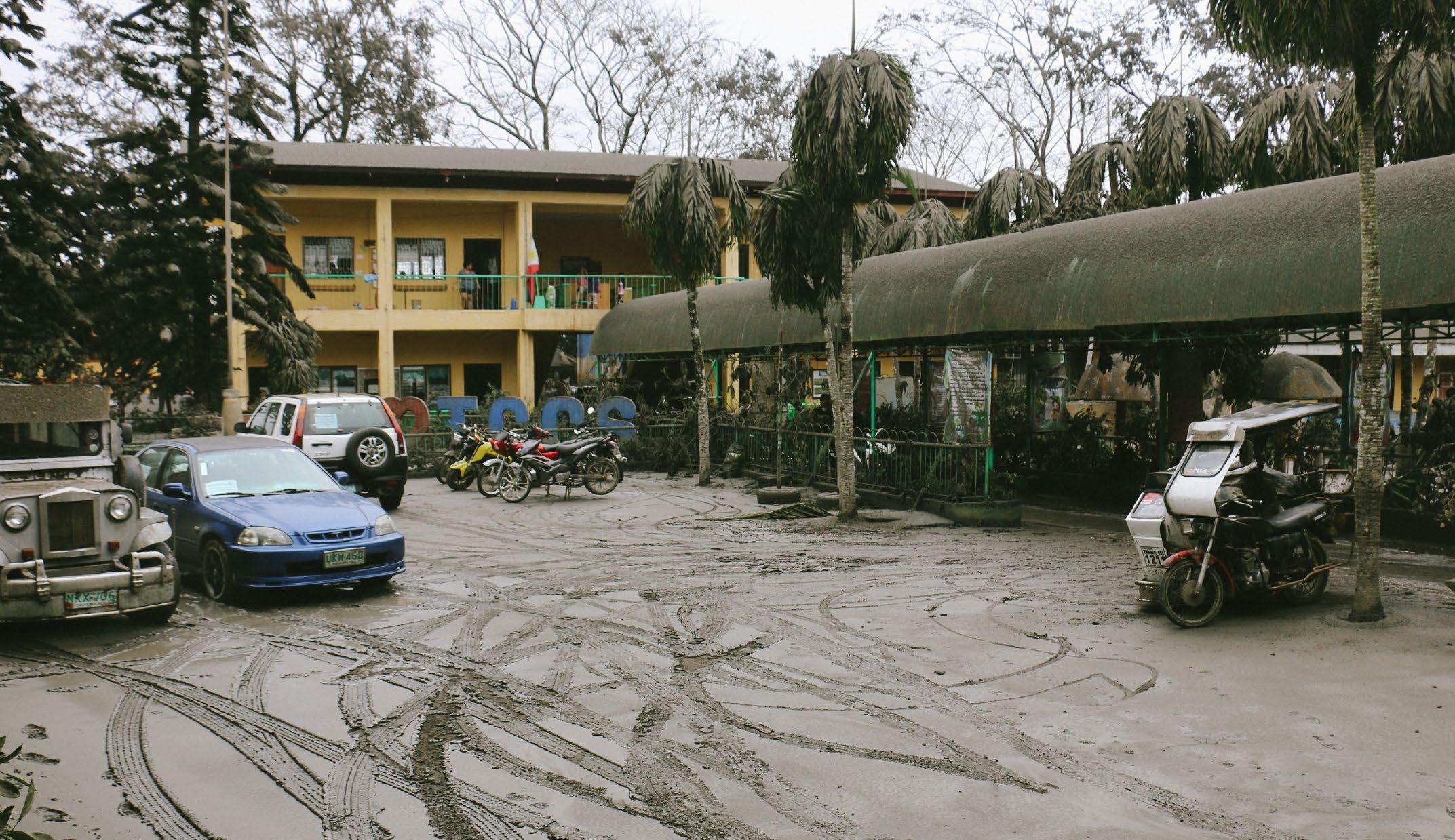
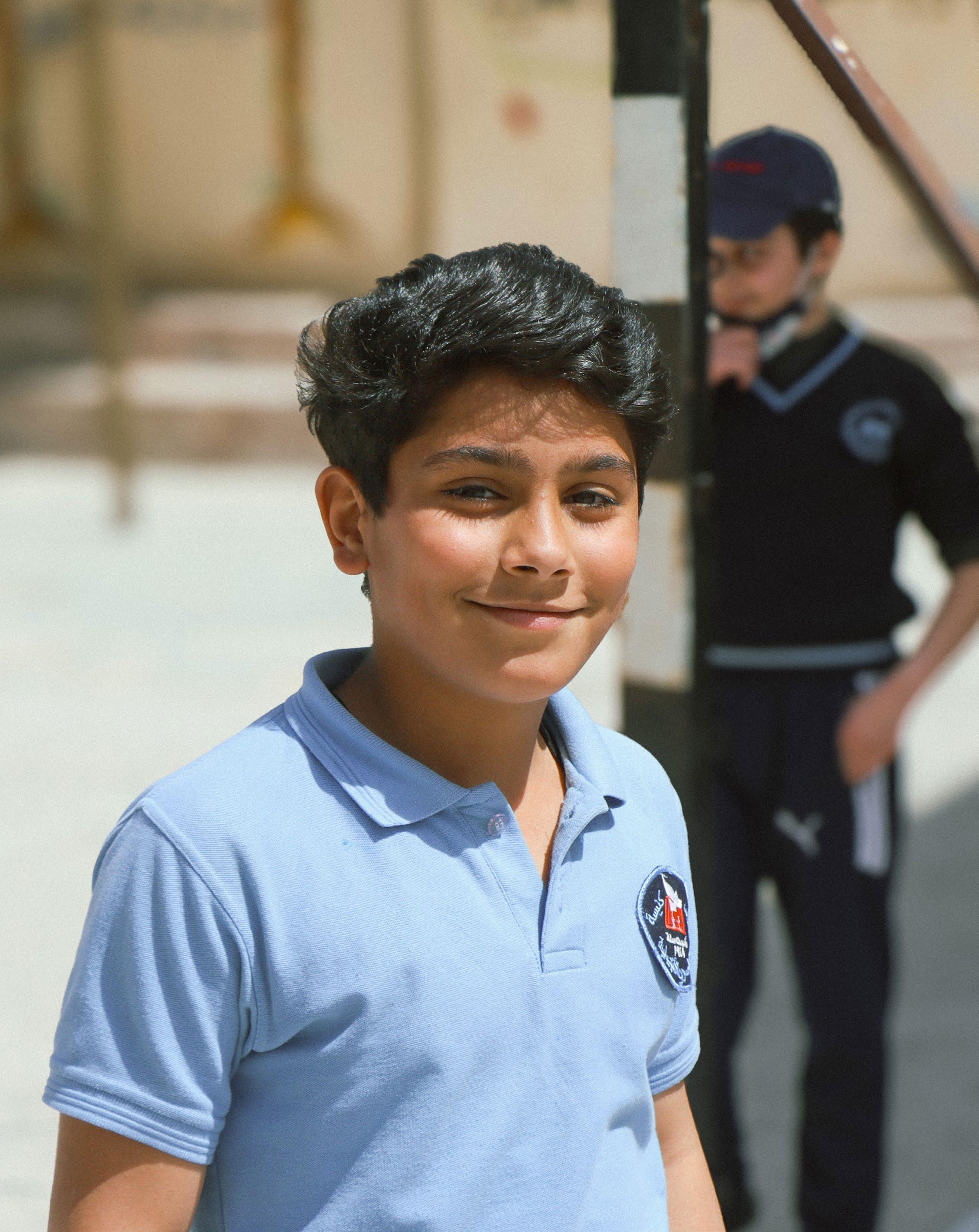
SUPPORT CHILD DEVELOPMENT CENTERS IN THE MIDDLE EAST
2025 Unboxing Hope
Transforming Lives Through Education
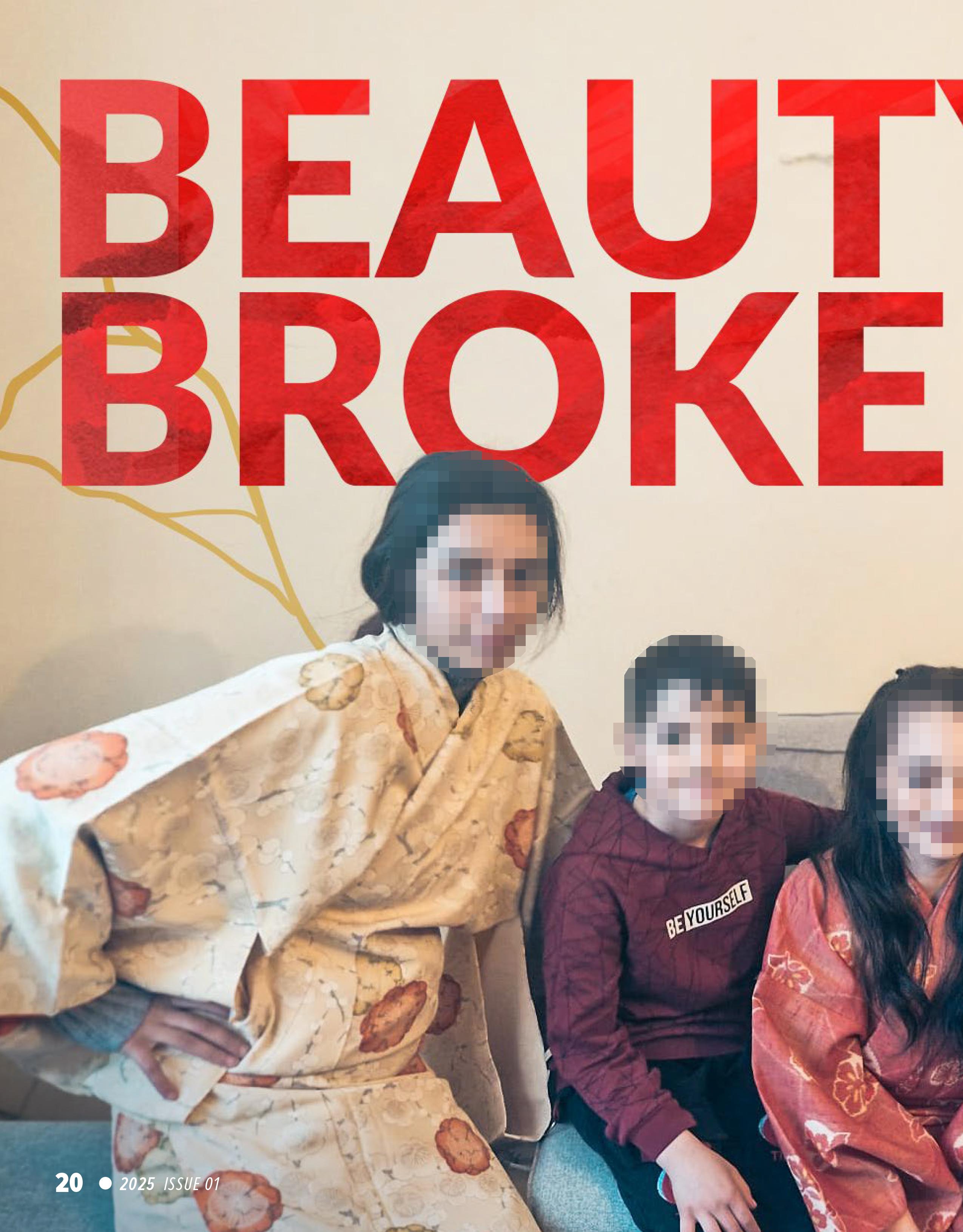
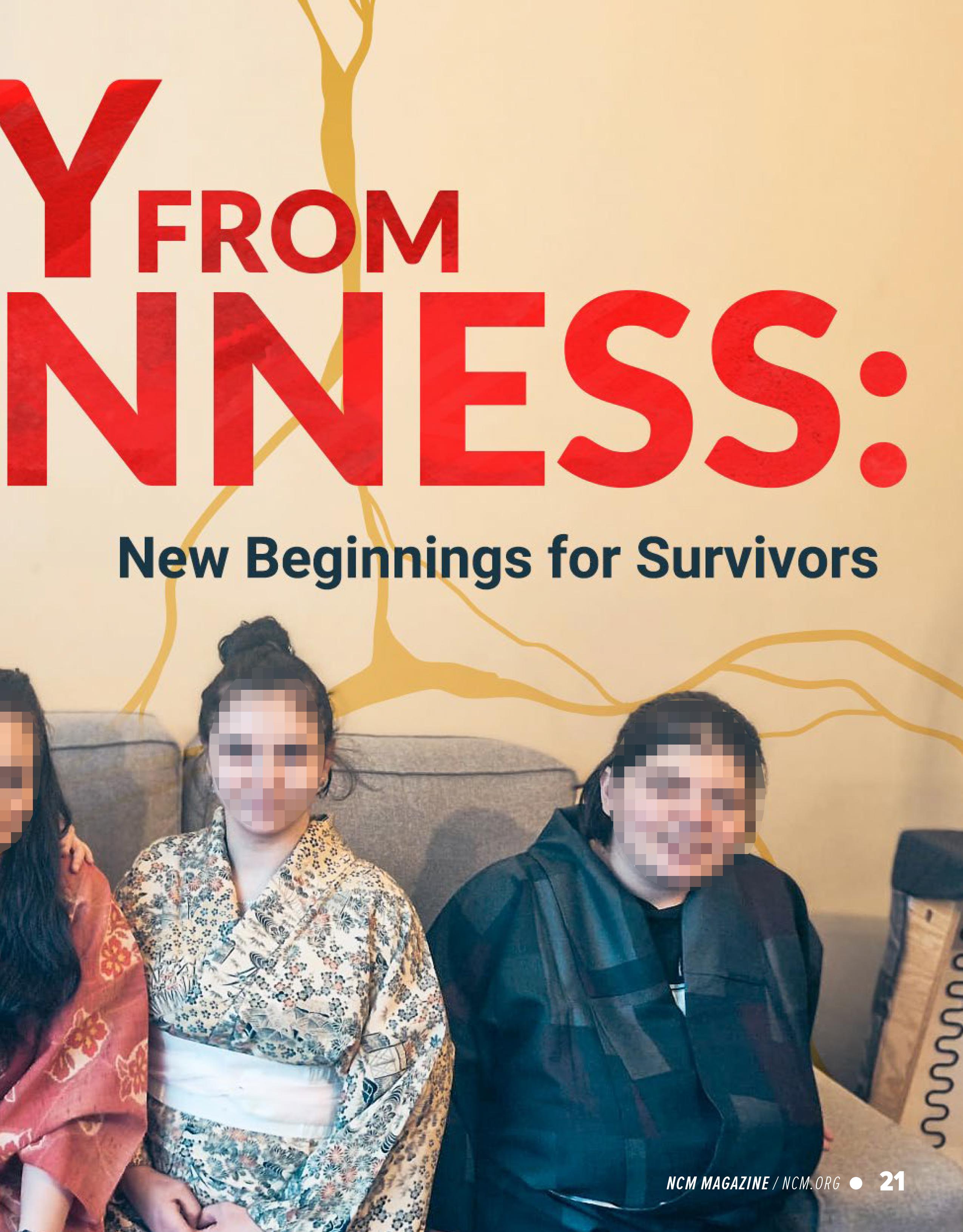
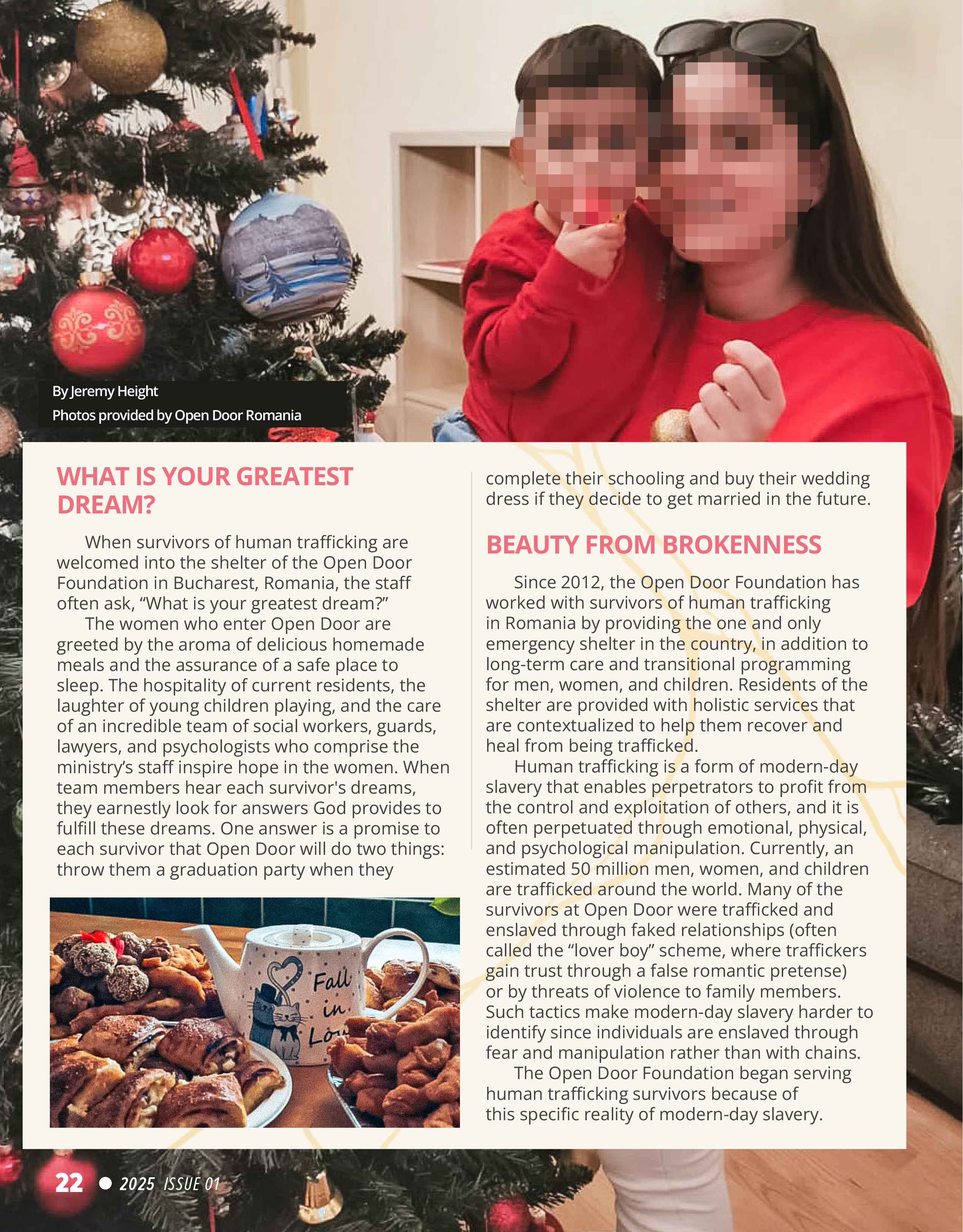

Without an emergency shelter in Romania, law enforcement officials lacked a safe place to house women and children who were attempting to escape trafficking, which significantly increased the chances of being trafficked again. By providing a safe and stable home, Open Door has helped reduce the instances of being trafficked again, as well as increasing the number of criminal convictions of traffickers with Open Door’s incredible team of lawyers.
As a part of the ministry’s 18-month residential program, women are provided with therapy, medical care, legal assistance, and support in learning how to engage in everyday life activities such as parenting, conflict resolution, cooking, and laundry. They are also provided with a weekly allowance to support their growth in independence and the time and space to heal before finding a job. Additionally, each woman is supported in pursuing her “greatest dreams” through enrollment in programs such as flight attendant school, public speaking, hair styling, photography, and the culinary arts.
Ana*, a graduate of Open Door and survivor of human trafficking, now actively fights against this injustice. Through the support of Open Door and a Nazarene Missions Team, Ana received vocational training to work as a flight attendant, and she is now a trainer for law enforcement agencies in identifying signs of human trafficking. Ana, in pursuing her own dreams for justice and life transformation, is also bringing about justice and transformation in the lives of other survivors.
Monica Boseff, executive director of the Open Door Foundation, describes the ministry as an embodiment of the Japanese art of kintsugi, where liquid gold is used to repair broken pottery. Just as the gold brings beauty from the brokenness of the teapot or cup in kintsugi, God has been at work bringing beauty from brokenness in each of the over 1,240 women, men, and children that have been served by Open Door since 2012.
“At the end of the program,” said Monica, “we want each survivor to walk out that front door knowing who she is in Christ, how beautiful she is, and with her dignity and independence restored. We want survivors to remember that they are loved for who they are.”
RADICAL GENEROSITY
A beautiful example of the life change that happens at Open Door is exemplified in how
new survivors are welcomed into the shelter. Along with a welcome pack of essential toiletries and clothes, a new resident is welcomed with a gift of three items from every other resident—a gift for the body, one for the mind, and one for the soul. The goal? To empower each woman in her independence and generosity as she selects three of her own belongings with which to bless the new resident.
Susan* was a recipient of this hospitality when she entered the emergency shelter, and
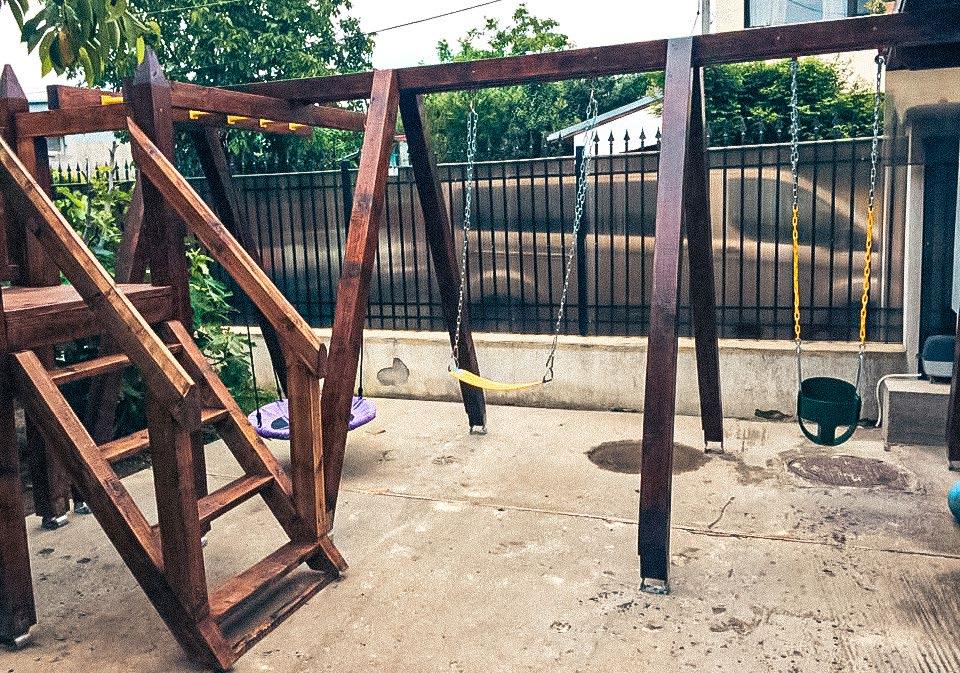
she initially found it difficult to accept such radical generosity from the staff and residents. She experienced this generosity further when, at Christmas, she was gifted a beautiful new set of pajamas. Susan quickly fell in love with this Christmas gift, so much so that she barely wore this treasured gift in order to keep it in pristine condition. Because of her meticulous care for her pajamas, Susan surprised everyone a few months later when she gifted them as part of her welcome gift to a new survivor entering Open Door. When asked why she would give away one of her most treasured belongings, Susan explained to the others, “Do you remember how I was when I got here? I had nothing, and you all gave me so much. I want to do the same.”
ANSWERED PRAYERS
Inside their shelter sits a basket filled with river stones. Each features a message written by a resident or staff member to represent an answered prayer or miracle. Open Door is a ministry built firmly on a foundation of prayer. God has proven his faithfulness through the life transformation of individual survivors and in the
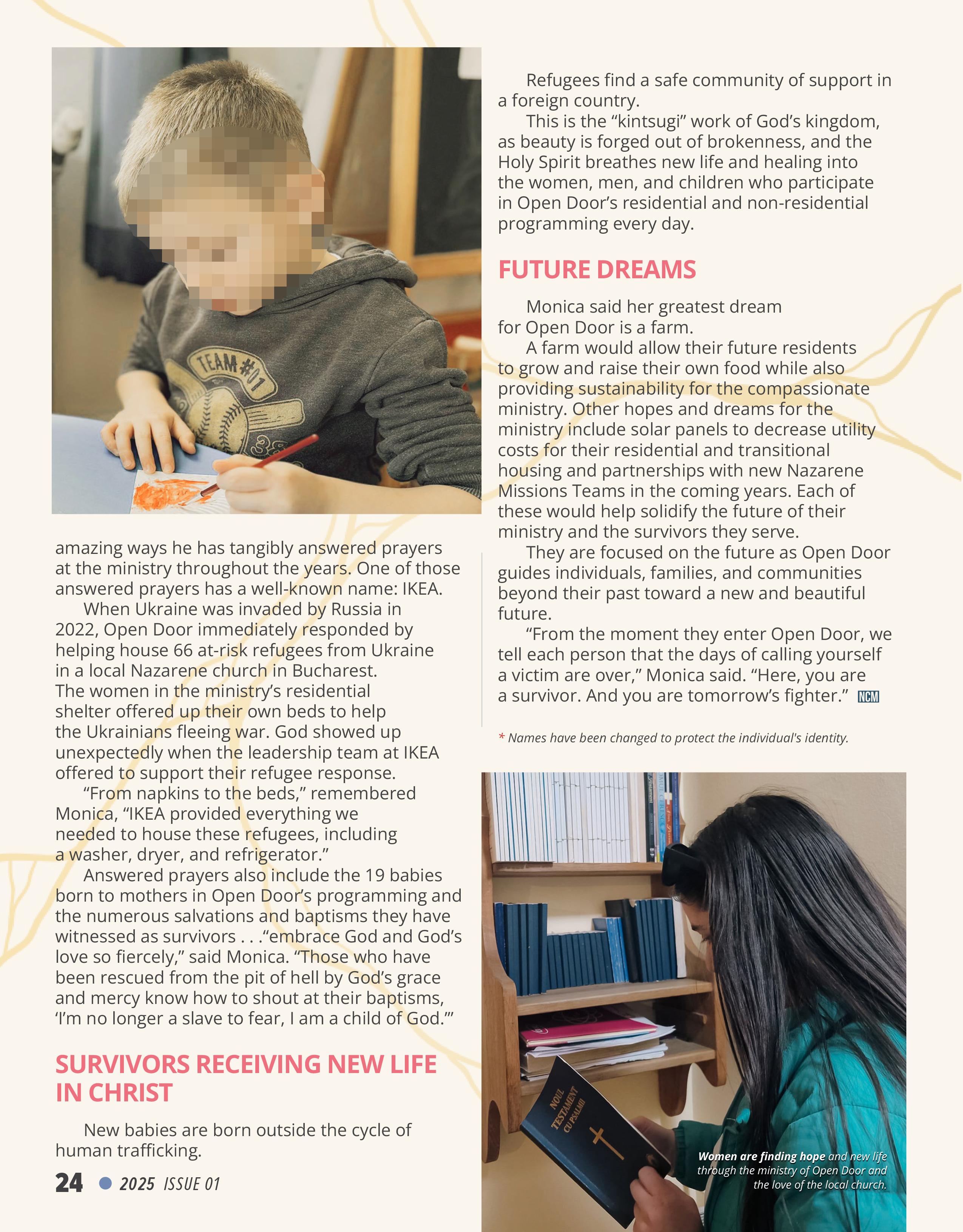
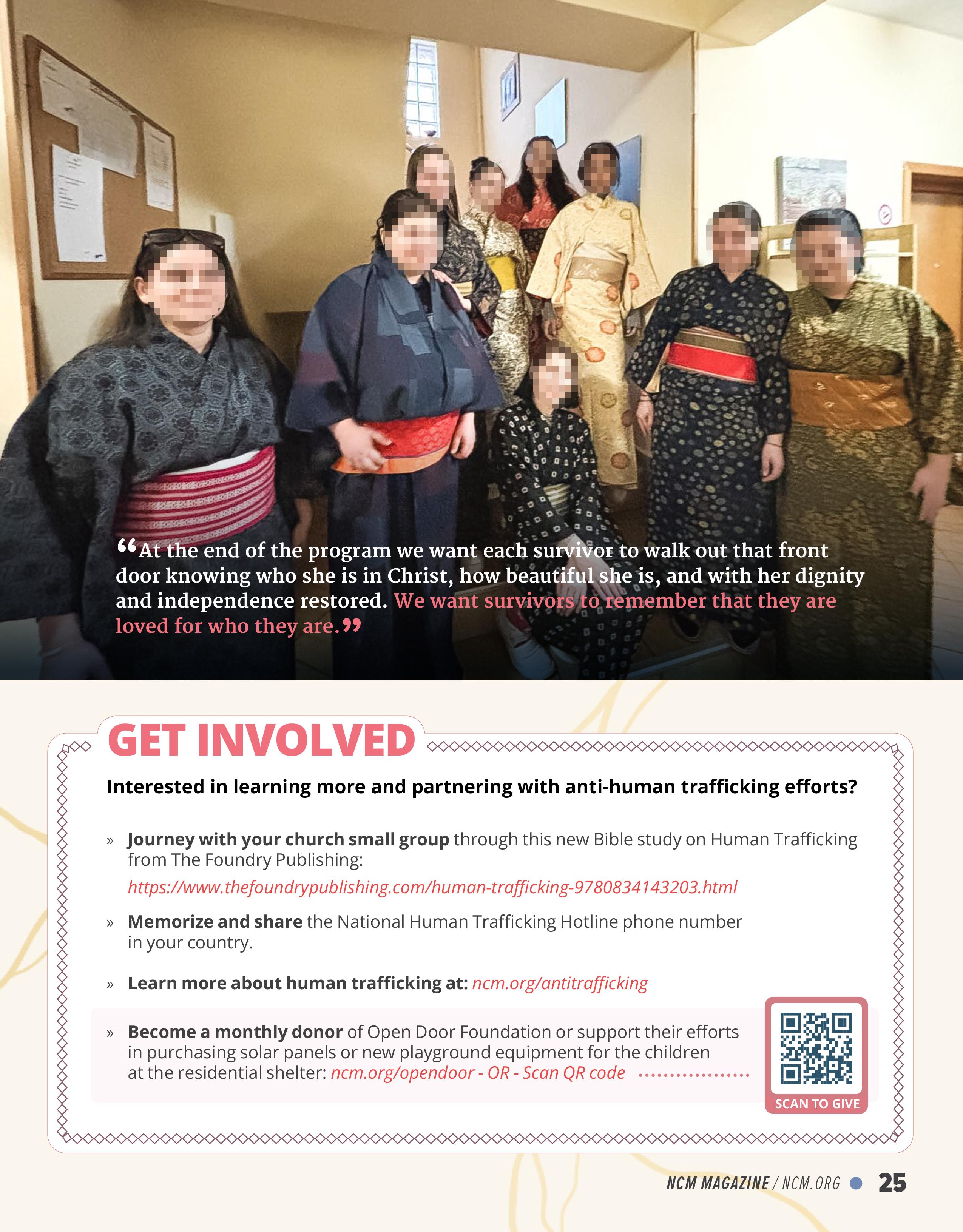
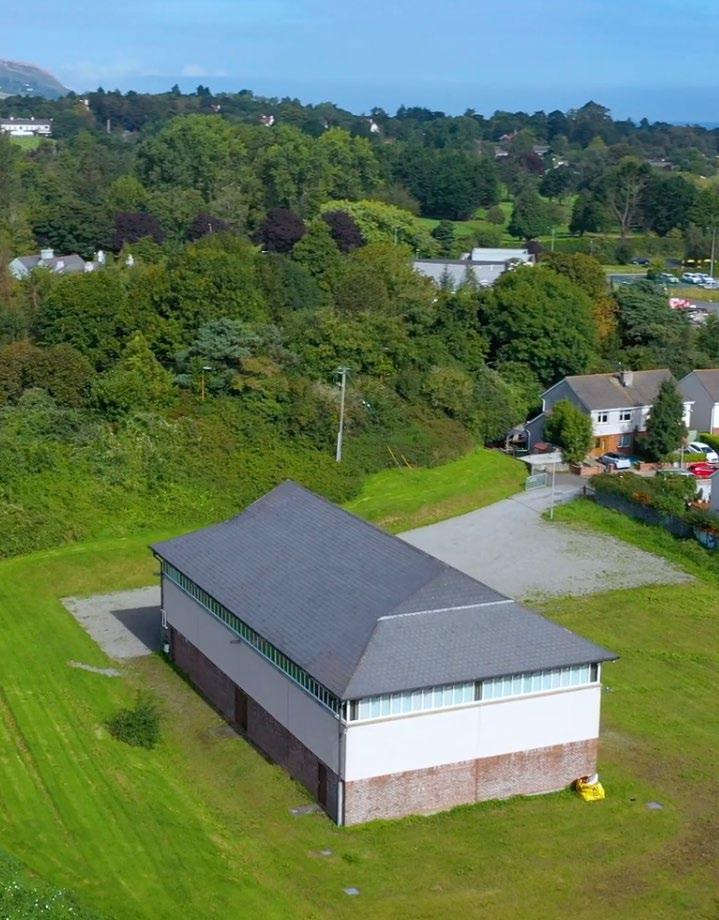
FROM PROTEST TO EMBRACE
One Church’s Role in Welcoming Refugees
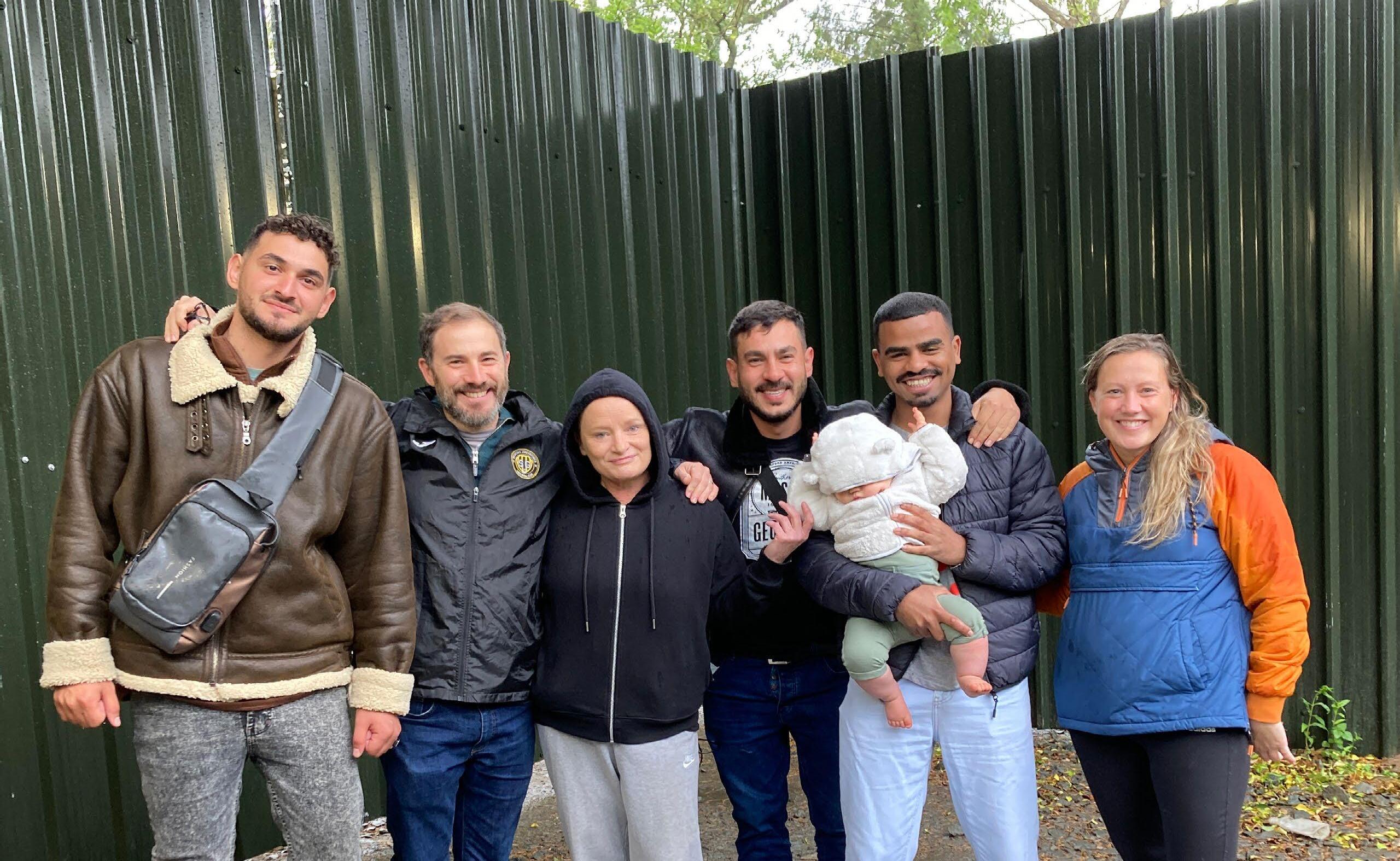
Over the last year, many in Ireland have shouted a resounding “no!” to refugees. However, from the Irish Church of the Nazarene, there has been a resounding “yes!” Many refugees in Ireland spend their first few days or weeks in the country living on the street, often in makeshift tents, before being moved to governmentrun facilities, such as former hotels, government-owned buildings, or newly erected tent shelters.
In May 2024, temporary housing in the form of tent accommodations was constructed in a neighboring village. This was met with significant opposition from residents in the area, most notably in the form of daily protests outside the entrance to the camp that made global headlines.
A PLACE OF WELCOME
In response, the Church of the Nazarene in Ireland decided to open its doors to these newly arriving asylum seekers so that they could socialize, learn English, and help integrate into life in Ireland.
“My father always told me, ‘If ever you are in trouble in life, find a church, and they will help you,’”
said Sofiane, a Palestinian man seeking asylum in Ireland and attending English classes at the Nazarene church. He is one of thousands of asylum seekers who arrived in Ireland in recent months, looking for a better future for themselves and their families.
There were many residents in the area who welcomed the refugees and were delighted to have a chance to connect with them but did not know how to help. The Church of the Nazarene began to connect closely with others in the community who wanted to support refugees –joining hands to do something collaboratively.
“I was a little bit scared from the protesters,” said Anas, a young man from Gaza. “When we started going to the church and seeing Irish people in
Story and Photos by NCM Eurasia
When the community protested, the Church responded with radical welcome, lasting hope, and the love of Christ for displaced neighbors.
the church, we met good people and a good community. It was going better and better. We started to feel safe, because we found people in the church that love us and care about us.”
CHANGING PERSPECTIVES THROUGH RELATIONSHIPS
For the first few weeks after the camp opened, the church became the central point for hosting English classes. Due to the daily protests, the church organized buses every Monday and Wednesday to transport people safely to the class. While the church hosted the classes, the teachers and volunteers came from all throughout the community. Soon, there were more than 40 volunteers who gave their time to build friendships and teach English. Another local education organization provided the learning materials and curriculum and training for volunteers.
The church's collaboration with other community groups and individuals was a high point and a reason for so many positive outcomes in a short time. Collectively, there were weekly running clubs, rewilding activities, community clean-ups, exercise classes, picnics, hikes, and advocacy events. The church focused primarily on English classes, sports, and collecting donations.
“It wasn’t necessarily about teaching English, but I knew it would be an incredible bunch of people who were strong and resilient, and if there was any way to connect with them and help,
it in my head, and then I understood we have to help others, regardless of who they are or where they came from … it's what Jesus did and wants us to do.”
“It wasn’t necessarily about teaching English, but I knew it would be an incredible bunch of people who were strong and resilient, and if there was any way to connect with them and help, I wanted to be involved.”
The classes paved the way for deep friendships to grow. “Learning their names, their stories, their likes and dislikes, and what they are good at—it was a joy to be able to be in a relationship with them,” said Rachel, a volunteer. “I have made a few lifelong friendships from that group, and that has been priceless.”
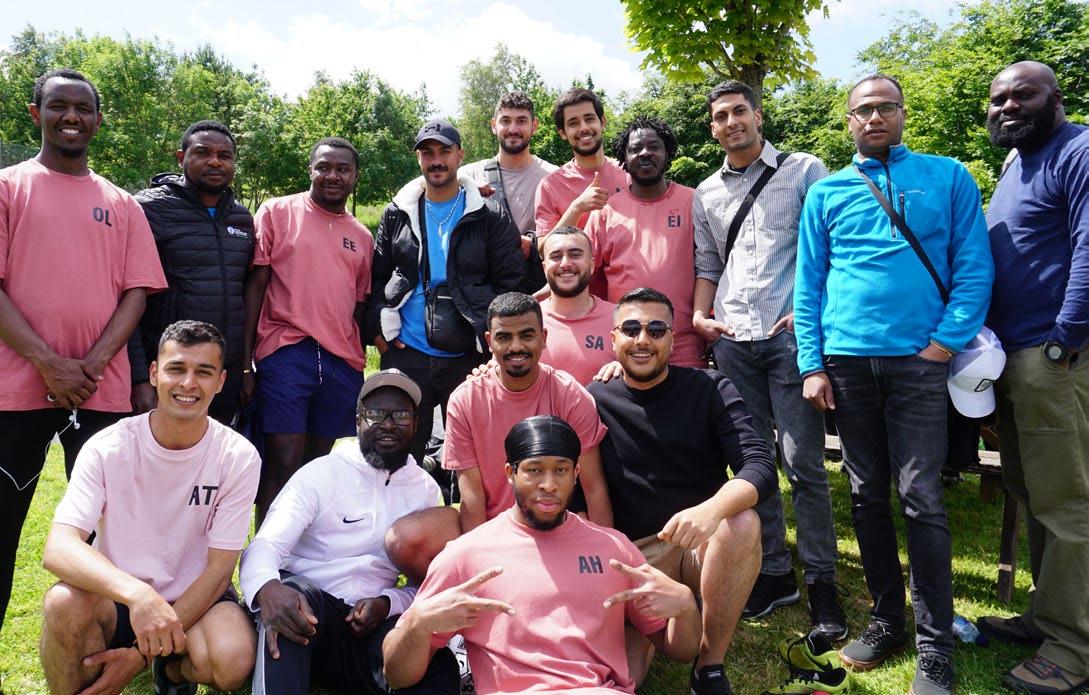
The church became a hub for language classes and the collection of material donations such as clothes, toiletries, and blankets. In addition, the local government’s integration team— responsible for helping refugees settle in Ireland—began to use an office at the church for one-on-one sessions with the men to connect them to the services available to them, such as health care, education, and work permits. The church also hosted a football (soccer) competition for a hospital in
“We take seriously Christ's command to welcome the stranger, especially when they are the recipients of hostility and violence for simply seeking refuge. The English classes, hosted at our church, provided safety and friendship and the mutual blessing of learning from each other — it was a joy! In welcoming them, we were, in fact, welcoming Christ.”
I wanted to be involved,” said Lindsay, a member of the church and English language volunteer.
Fiona, another church member, said, “I didn't want to help originally, but God poked me. God kept putting
Gaza, and a team from the refugee camp took part. Several of them knew the hospital personally and relished taking part in the tournament.
The camp became a temporary home to people
from all over the world—Palestinians, Afghans, Somalis, Nigerians, and Sudanese. A number of men from Eswatini (formerly Swaziland) were there, including Muzi, who was born in the Nazarene hospital there.
SHARING CHRIST WHEN HOPE IS NEEDED MOST
“I must say in those days, Ireland had begun to feel like home; I really enjoyed studying the Bible with people who actually show the heart of Christ,” said Muzi, who began to attend a weekly home group at the Nazarene pastor’s house near the camp.
Anas and Ismael are two young men from Gaza who regularly attend the church. With the help of the church and others in the community, they managed to put down roots in the area. Both have started jobs in a coffee roastery and bakery and are able to pay their own rent. In turn, they are also serving others. “You believed in me to open the church,” said Anas, who is now a key holder and helps host sports twice a week in the church.
“Through the competitions, playing, support for housing, for clothes and water — you fix all my life. Me and my friends as well,” said Ismael, who lost his father and sister to Israeli airstrikes in Gaza.
“It is so important for the church to engage in these issues,” said Rachel, “because the church has the ability to bring love and freedom to such a desperate situation. It says in 1 John, ‘There is no fear in love, but perfect love drives out fear’, and there has been and still is a lot of fear surrounding asylum seekers coming into Ireland. However, the church has the opportunity to drive out that fear with love.”
Despite the hostility of protests and the intimidating atmosphere in the town, the church made a decision to stand with these men. Over the course of the year, the church has developed a reputation for being a place that cares for refugees. “I feel like that is the definition of what church is,” said Lindsay. “It is meant to be that place in the community that meets people with whatever they need.”
“Our life as a church has been enriched by the whole experience,” said Rev. Tim BowenEvans. “To welcome the stranger is part of the fabric of Christian life. To work hand in hand with others in the community and practice compassion together has been incredible. We can do so much more when we partner with others.”
“We take seriously Christ's command to welcome the stranger, especially when they are the recipients of hostility and violence for simply seeking refuge,” said Rev. Luke Carrig, one of the other pastors of the church. “The English classes, hosted at our church, provided safety and friendship and the mutual blessing of learning from each other — it was a joy! In welcoming them, we were, in fact, welcoming Christ.”
When asked about coming to church for the first time, Anas explains, “you feel completely that you are with your family. You are home.” That has been the church’s dream all along, that these men who have traveled thousands of miles in dangerous conditions would feel loved and embraced — that they would indeed feel like they are home.
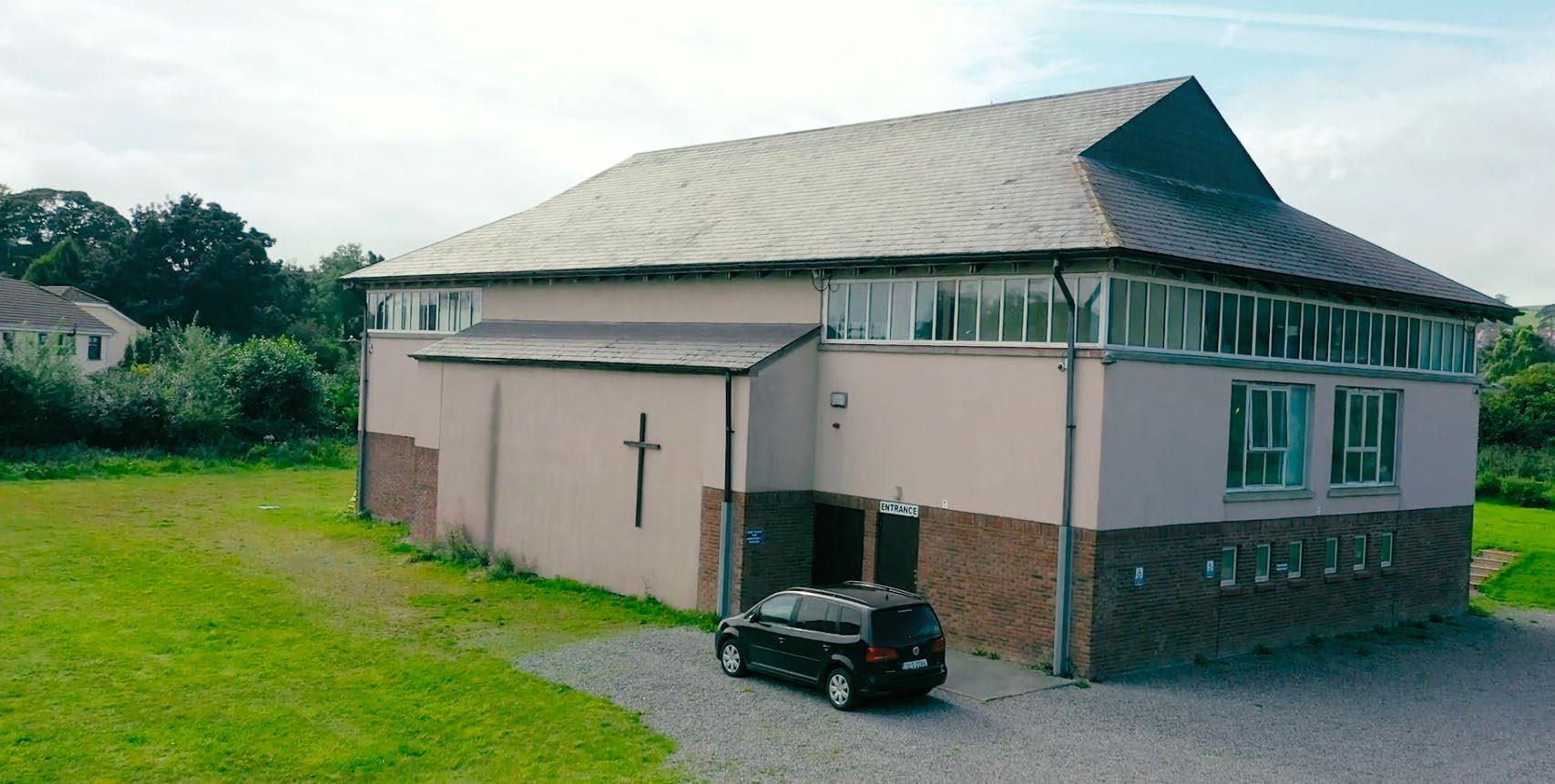

SEEKING PEACE:
Praying
for the Democratc Republic of the Congo
The Democratic Republic of the Congo (DRC) is in the grip of a worsening humanitarian crisis as violent conflict devastates the eastern regions. Armed groups have seized control of key areas, disrupting the economy and forcing essential services to a standstill. Banks are closed in some areas of the country, food shortages are worsening, and hundreds of thousands of people have been displaced, fleeing in search of safety and stability.
This crisis has included widespread human rights violations, including the destruction of homes, looting, and attacks against women and children. Schools have closed, putting children at risk of recruitment into armed groups, and hospitals have been raided, restricting humanitarian aid.
Despite the dangers, the Nazarene church continues to minister to those in need, offering emergency relief and trauma care. Local congregations are providing food, water, and essential supplies to displaced families while also working to bring spiritual and emotional support. Leaders are engaging in peacebuilding efforts and offering trauma counseling to help individuals recover from the deep wounds of war.
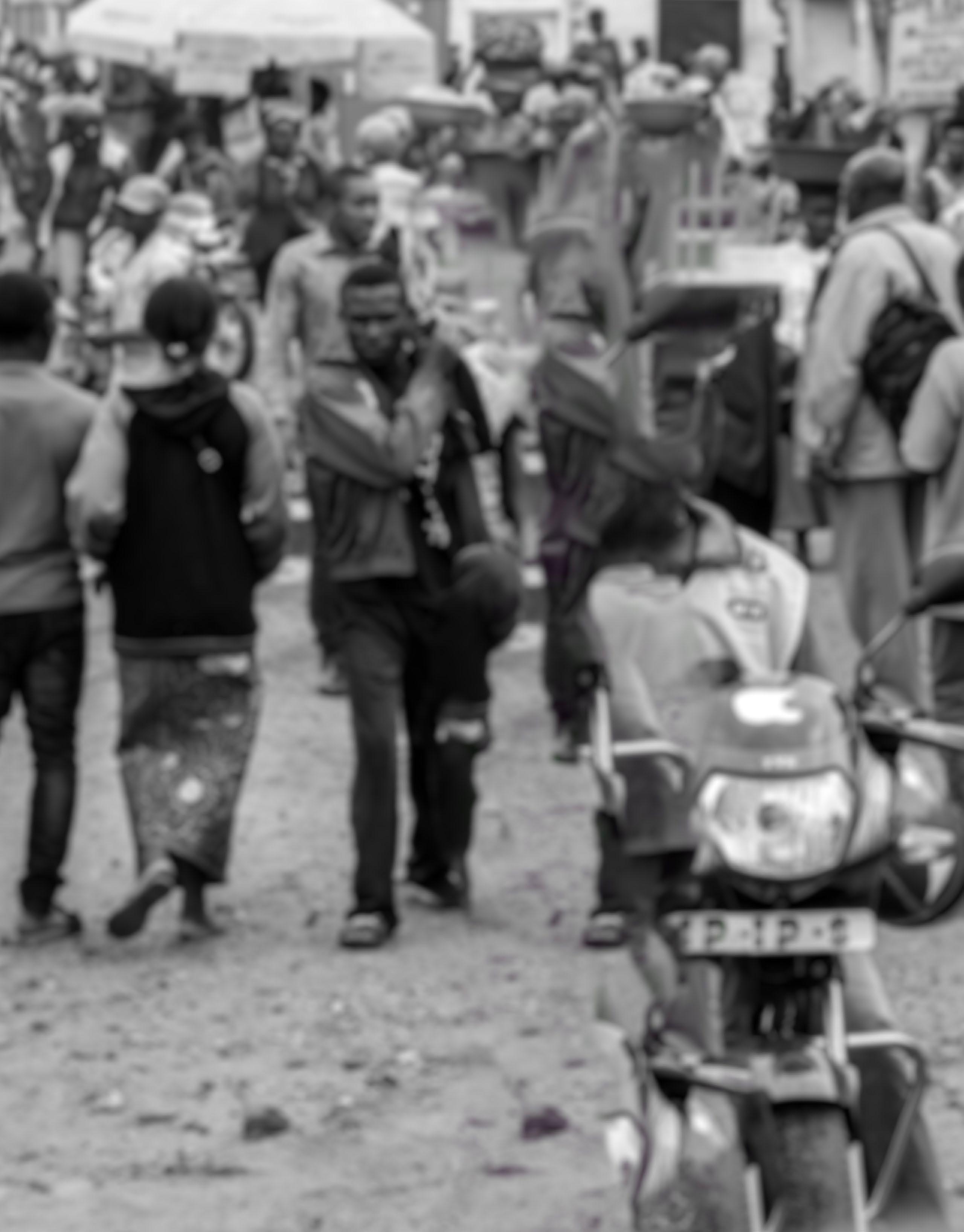

Amen. Amen Heavenly Father,
You are the God of peace, justice, and mercy. We lift up the people of the DRC, crying out for your intervention in their time of great suffering. In a land torn apart by violence, bring the peace only you can bring. Still the weapons of war, dismantle the plans of those who sow destruction, and raise up leaders who will pursue justice and righteousness.
Lord, we pray for the innocent—those forced from their homes, those who have lost loved ones, and those who are struggling to survive. Provide shelter for the displaced, food for the hungry, and safety for the vulnerable.
Comfort those who are grieving and strengthen those who are weary.
We lift up the church in the DRC as it seeks to be your hands and feet in this crisis. Bless the efforts to provide aid and multiply resources so that all who are in need may find help. Give wisdom to church leaders as they navigate these challenging times, and protect those who risk their lives to serve others. May the church be a refuge and a place of hope, where the gospel is proclaimed and lives are transformed.
Father, we especially pray for the women and children who have suffered so deeply. Surround them with your protection. Heal their wounds—both visible and unseen—and restore their dignity. Raise up communities that will care for them, advocate for them, and show them your boundless love.
We also pray for peace in the hearts of the young. Protect them from recruitment into violence, and open doors for education and opportunity.
Let them see a future beyond conflict, a future built on your promises of restoration.
Lord, let your kingdom come, and your will be done in the DRC as it is in heaven.
May the suffering find hope, the broken find healing, and your light shine even in the darkest places.
In the name of Jesus, our Prince of Peace, we pray.


Scarcity
How a Community Water Project Changed Lives Abundance to from
In the heart of a rural community in Kenya, access to clean water has long been a challenge for many households. Women and children bore the burden of walking long distances daily to find water from contaminated sources, exposing them to waterborne diseases and limiting time for other productive activities. Recognizing this urgent need, Nazarene Compassionate Ministries, in partnership with local churches, initiated a community-led water project to provide sustainable access to clean water.
IDENTIFYING THE NEED
Before the project was established, residents of Rachuonyo community relied on seasonal rivers and unprotected wells, which frequently dried up during prolonged dry seasons. Water scarcity contributed to poor sanitation, increased school absenteeism, and high incidences of waterborne diseases such as cholera and typhoid. The need for a long-term solution was evident.
In collaboration with local leaders, churches, and community members, NCM in Kenya conducted an extensive needs assessment to understand the community’s priorities. The findings revealed that access to clean and safe drinking water was the most pressing concern, prompting NCM Kenya to mobilize resources and expertise to address this critical issue.
IMPLEMENTING A SUSTAINABLE SOLUTION
The Rachuonyo Community Water Project was designed to provide a sustainable water source to benefit the entire community. The first step was drilling a borehole. With the help of technical experts and support from the local government, NCM Kenya identified a strategic location within the Rachuonyo Church of the Nazarene compound for a deep borehole with high water yield potential. The borehole was drilled to a depth of 74 meters, ensuring a reliable water supply throughout the year. In addition to providing clean water, NCM Kenya focused on training the community on proper water management and hygiene. A Water Management Committee (WMC), composed of local community members, was trained to oversee the maintenance
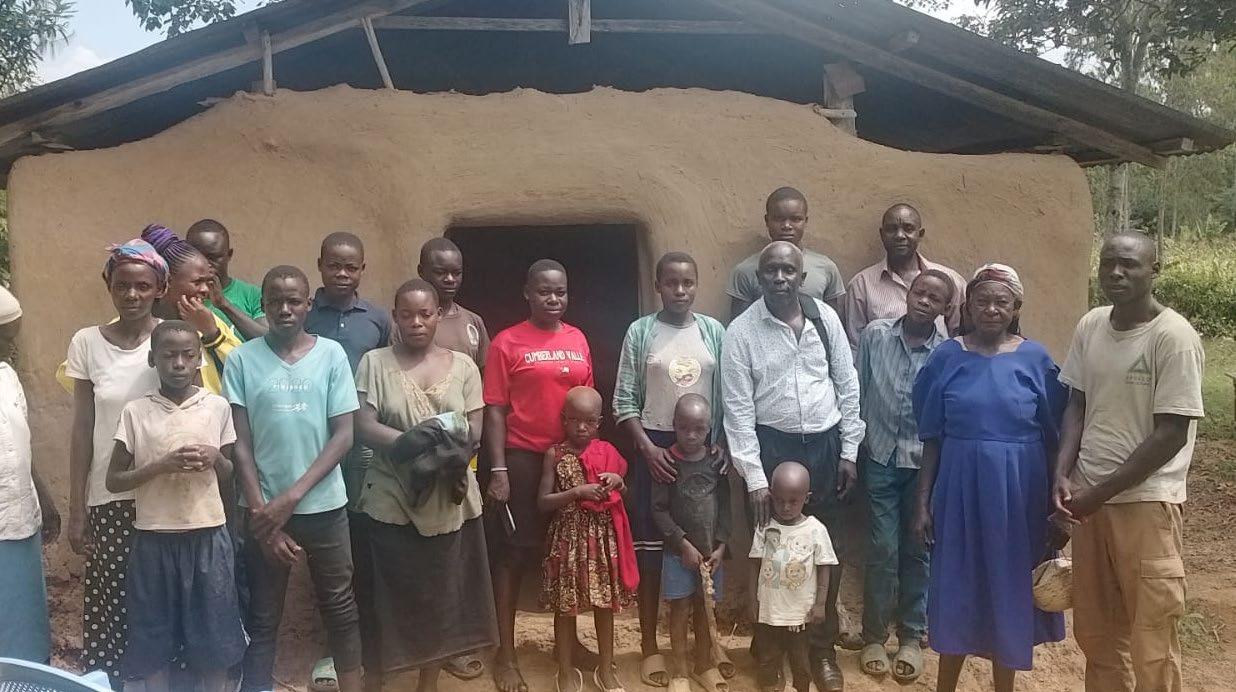
and management of the water system. Hygiene awareness sessions were also conducted to educate residents on proper water handling, sanitation, and disease prevention, ensuring that the benefits of clean water would be long-lasting.
A RIPPLE EFFECT: THE IMPACT OF CLEAN WATER
Since the project’s completion, the impact has been life-changing for the residents of Rachuonyo village. Over 1,215 households now have access to safe drinking water, significantly reducing waterborne diseases and improving overall community health. The availability of clean water near a community school has led to improved school attendance, as children no longer have to fetch water before classes, allowing them to focus more on their studies. Women, who previously spent hours collecting water, now have more time to engage in incomegenerating activities such as farming and small businesses, bringing economic and social benefits to the entire community.
For many, the water project has been a turning point in their lives. Caroline Owino, a mother of five, has experienced the lifechanging impacts of access to clean water. “Before this project, we used to wake up
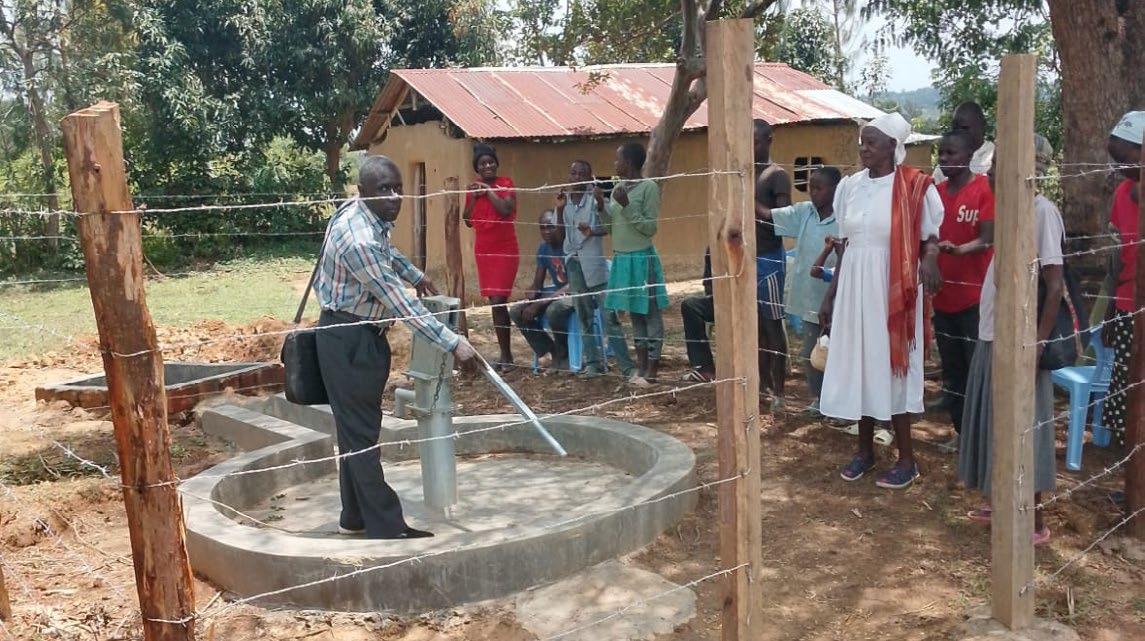
before dawn and walk for hours just to fetch water,” she said. “The water was often dirty, and our children were constantly sick. Now, with the borehole nearby, life has become much easier, and my children are healthier.”
The local school’s headteacher, Paul Ojwang’, has seen an improvement for the children in the community. “Access to clean water has greatly improved hygiene in our school,” he said. “Cases of waterborne diseases have reduced, and our students can now focus on their education.”
SUSTAINABILITY AND FUTURE PROSPECTS
To ensure the project's long-term success, NCM Kenya continues to work closely with the community through the Water Management Committee. The committee is responsible for routine maintenance, ensuring the system remains functional for years. A small user fee has been introduced to support maintenance costs while keeping the water affordable for all. Looking ahead, the project plans to install a solar-powered pumping system to reduce operational costs and promote environmental sustainability. This eco-friendly approach aligns with NCM Kenya’s commitment to environmental conservation and affordability for the community. Additionally, the Water Management Committee has started working on the construction of a ten-thousand-liter elevated water tank to store and distribute water to designated collection points across the village, which will minimize congestion and reduce the distance households need to travel to fetch water.
A TESTAMENT TO COMMUNITYDRIVEN CHANGE
The Rachuonyo Community Water Project stands as a testament to the power of communitydriven solutions and faith-based development initiatives. Through strategic partnerships, innovation, and a commitment to serving vulnerable communities, Nazarene Compassionate Ministries Kenya has successfully transformed lives by providing sustainable access to clean water. With clean water now flowing, the people of Rachuonyo village can look forward to a healthier and more prosperous future.
Without clean water, women and children face missed work, lost schooling, and illness from contamination.
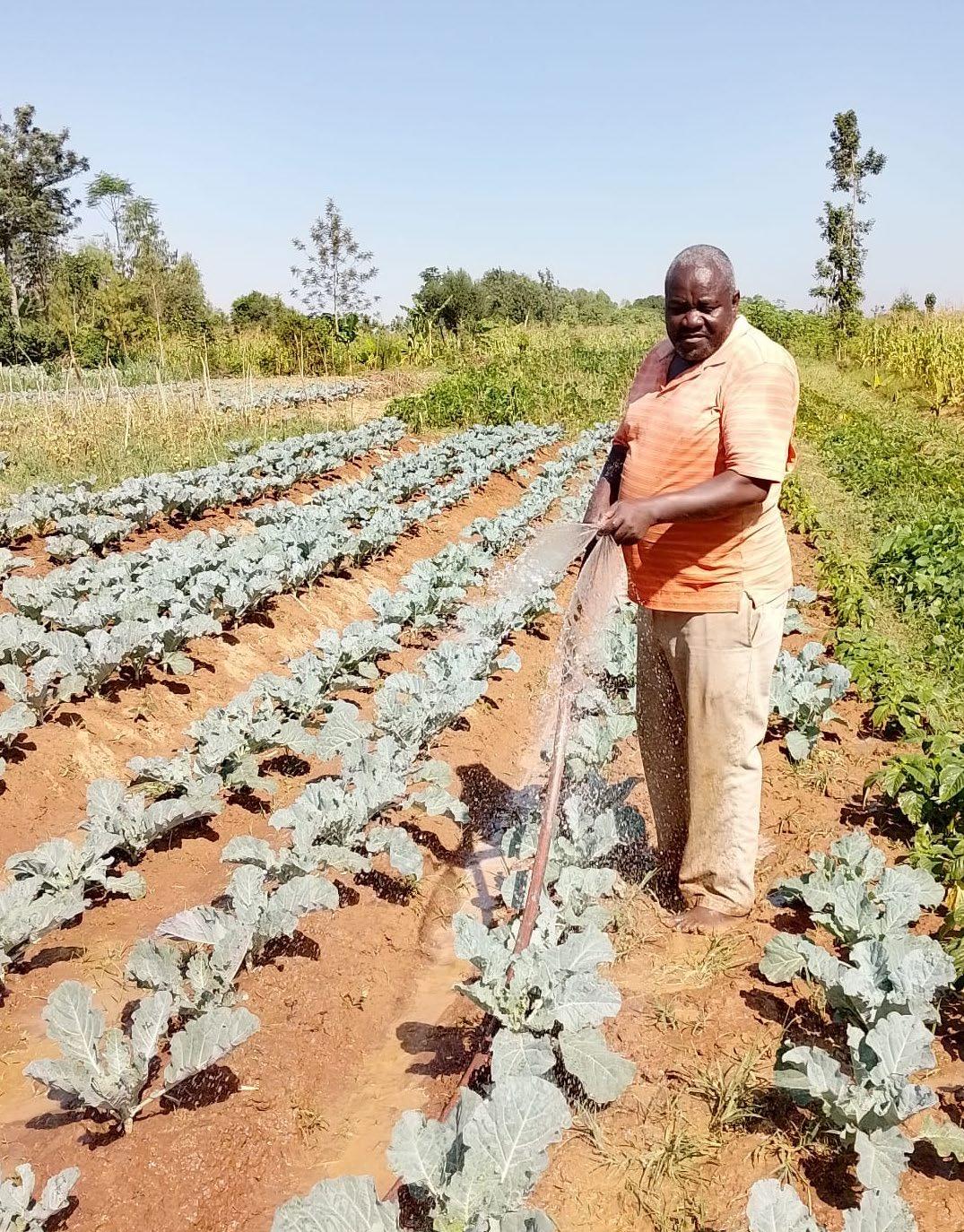
“Before this project, we used to wake up before dawn and walk for hours just to fetch water. The water was often dirty, and our children were constantly sick. Now, with the borehole nearby, life has become much easier, and my children are healthier.”
When Typhoon Kristine devastated Banyaga, a town in the Philippines, during the week of October 24, 2024, it changed the lives of everyone in the community forever.
For Pastor Levi, the world around him seemed to crumble, and his faith was both tested and strengthened. It was his first time experiencing such a disaster as a community pastor, and the memory of it remains etched deeply in his heart.
"The rain was relentless, and the wind howled as if it could tear the heavens apart," Levi said. "There was no electricity at that time, no data connection. We couldn't reach anyone from the Banyaga Church of the Nazarene. It felt like the world was closing in on us."

As the typhoon's fury intensified, the house he was staying in shuddered under the storm's force. The wind rattled the walls, and the rain hammered down as though it could wash everything away. Fear gripped his heart — not for his own safety but for those he held dear.
"It came to a point where I had to pray," he said. "'Lord, your will be done. Even if it's me who perishes, just spare my loved ones and the brothers and sisters in Banyaga."'
By God's grace, Levi survived the storm. But what awaited him the next day would change him forever.
Story by Rev. Jun Macas, Southern Tagalog District Superintendent
Photos provided by the Asia-Pacifc Region

THE AFTERMATH OF TYPHOON KRISTINE
The morning after the typhoon, Levi mounted his motorcycle and loaded it with food for the evacuees who had sought refuge at the Banyaga Church of the Nazarene. As he rode through the battered landscape, his heart broke at each scene he encountered.
"The bridges were destroyed, and landslides had buried homes. Massive tree branches had fallen from the mountains, blocking roads. Entire houses were swept away, and people ... some had lost their lives," Levi remembered.
The devastation was overwhelming, but what struck him most were the faces of the people he passed. Their eyes were hollow with grief, their expressions etched with despair. Men, women, and children stood amid the ruins of their homes, clutching what little they could salvage. Some mourned silently while others wept openly, their cries blending with the still howling winds.
"It was painful to witness," lamented the pastor. "Their faces were filled with a sadness I cannot describe. I didn't know what to say to comfort them. What words could possibly mend the pain of losing their homes, their livelihoods, their loved ones?"
DELIVERING MORE THAN FOOD
As Levi reached the community's evacuation center, he was greeted by families huddled together, clinging to one another for comfort. Though the building provided shelter from
“This tragedy became an opportunity to show the community that there is still hope. People began to believe again, trusting that God has a better future waiting for us.”
the storm, it could not shield them from the emotional and spiritual weight they carried.
He handed out food and supplies, praying silently as he moved from one family to another. The physical needs were immediate and urgent, but Levi sensed a deeper hunger—a longing for hope.
FINDING HOPE IN THE RUBBLE
Despite the destruction, he saw glimmers of hope emerge in the days that followed. Help began to arrive,
clothing and clean water delivered by strangers who had heard of their plight. Volunteers from neighboring towns showed up with smiles and open hands, ready to help rebuild what had been lost.
"We are so thankful to God," he said. "Even in the midst of trials, we can say [God] has not forgotten us. The kindness of friends and strangers alike was a reminder of [God’s] faithfulness."
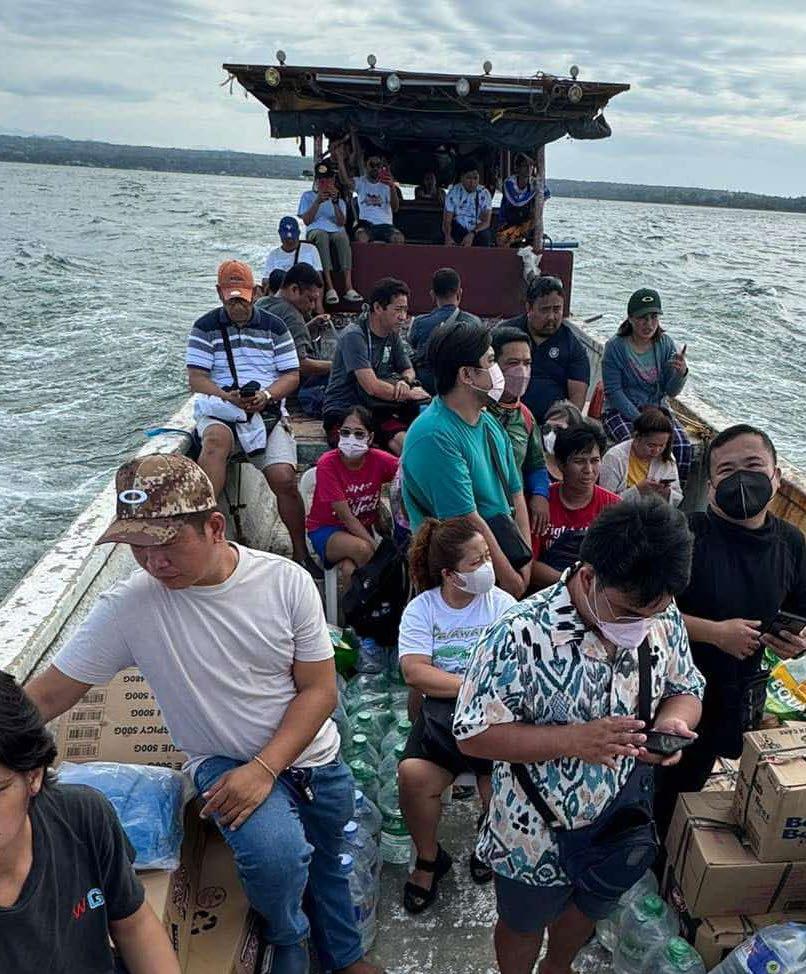
For the people of Banyaga, the disaster became a turning point. Slowly but surely, they began to rebuild not just their homes but also their faith. Pastor Levi saw how the community drew strength from one another, inspired by the love and support they received.
"This tragedy became an opportunity to show the community that there is still hope. People began to believe again, trusting that God has a better future waiting for us."
A VERSE TO CLING TO
In moments of doubt and weariness, Levi often turns to Isaiah 41:10, a verse that became a beacon of light during those dark days: "Do not fear, for I am your God. I will strengthen you and help you; I will uphold you with my righteous right hand."
"This verse reminded me that God's promise is sure," he says. "Even when everything seems lost, he is there to strengthen us, to help us, and to lift us up."
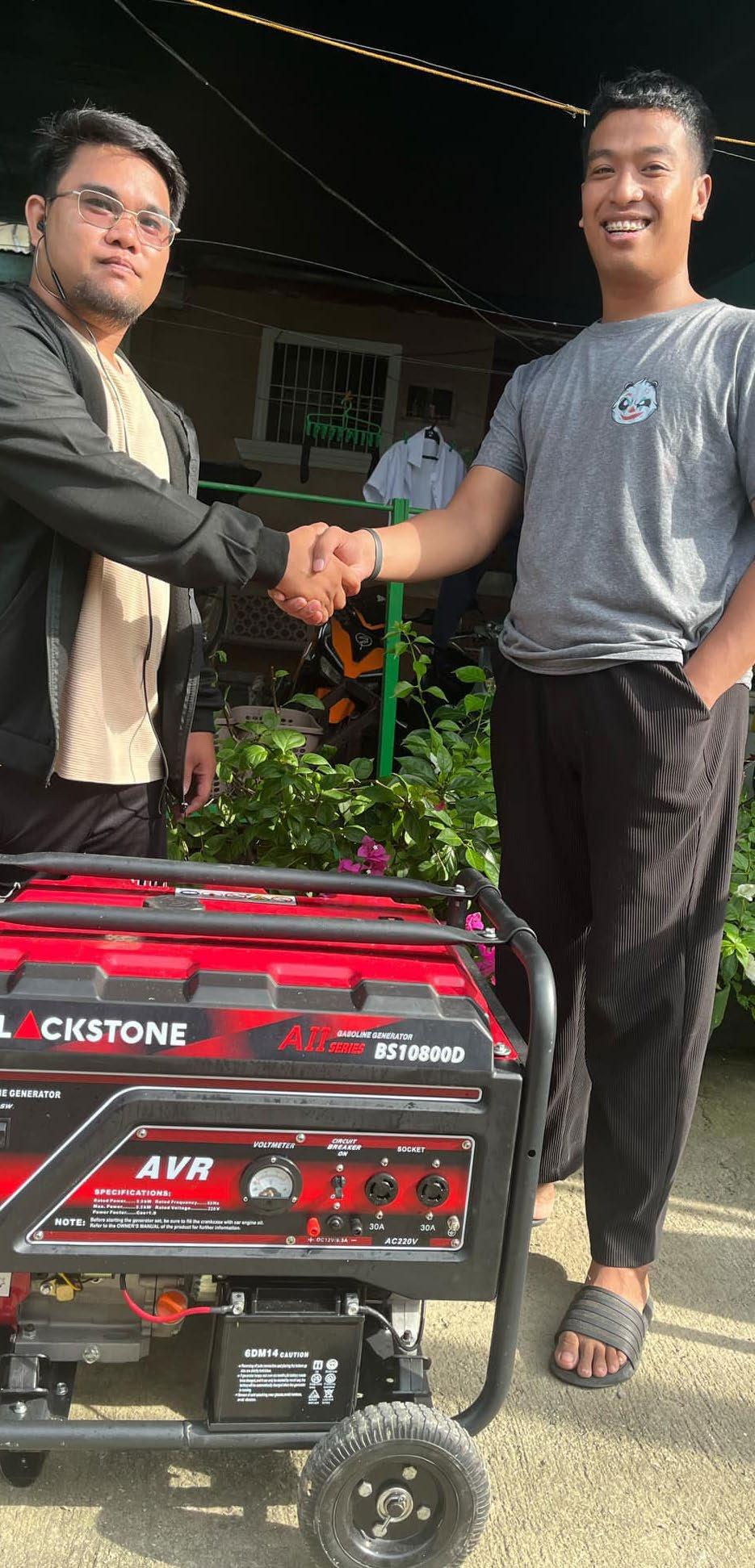
THE LESSON OF TYPHOON KRISTINE
"Disasters like this strip away everything we rely on," Levi said. "They remind us of how fragile life is but also of how faithful God is. It's in moments of brokenness that God’s light shines the brightest. We may not understand why these things happen, but we can trust that God is using them for a purpose. And through the pain, God shows us that there is always hope."
For Pastor Levi, Typhoon Kristine was not just a test of endurance—it was a testament to God's unchanging grace. And as he continues to serve the people of Banyaga, he carries with him a message of hope, one rooted not in circumstances but in the unwavering faithfulness of God.

“Disasters like this strip away everything we rely on. They remind us of how fragile life is, but also of how faithful God is. It's in moments of brokenness that God’s light shines the brightest. ”

After the storm, the church delivers hope through food, medical care, and rebuilding supplies.
Long-term rebuilding begins with partnership. Local churches, alongside NCM, are helping communities recover, rebuild, and thrive after disaster.

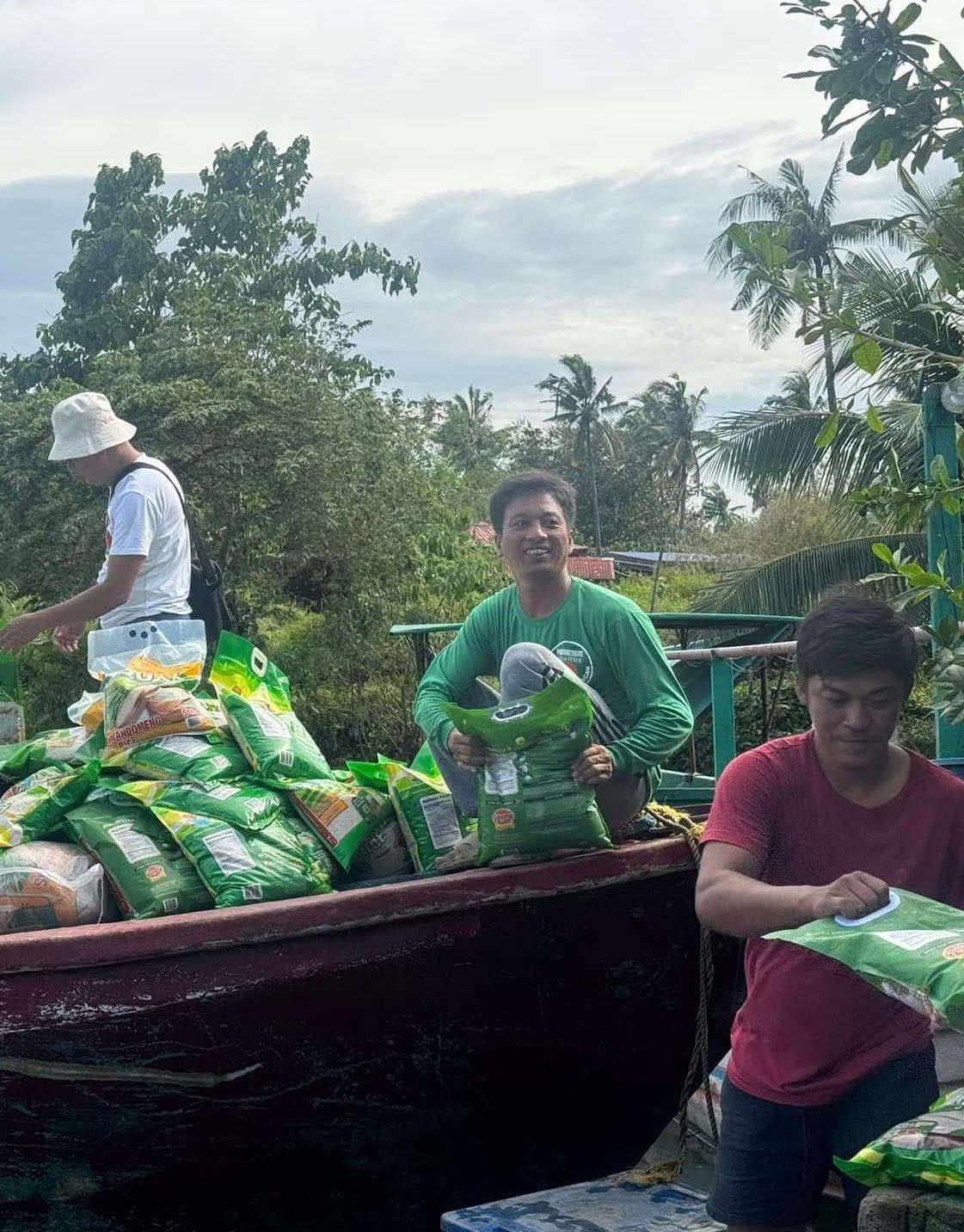



READ
WORTH SEEING: VIEWING OTHERS THROUGH GOD’S EYES
By Amy L. Williams
This book takes lessons learned from Amy Williams’ decades of ministry among high-risk youth and provides practical tips to equip you to see others the way God sees them.
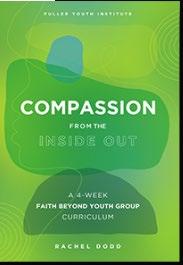
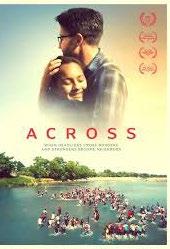
STUDY
COMPASSION FROM THE INSIDE OUT
By Rachel Dodd
This study is geared toward helping teenagers process how to care for the world around them, show up for their friends who are struggling, and speak up for those who are hurting in their communities.
WATCH
ACROSS: WHEN HEADLINES CROSS BORDERS AND STRANGERS BECOME NEIGHBORS
This docuseries follows three families who came to America to escape violence and a church community whose hearts were changed when they started treating these families as brothers and sisters in Christ.
Watch it here: www.acrossdocumentaryseries.com
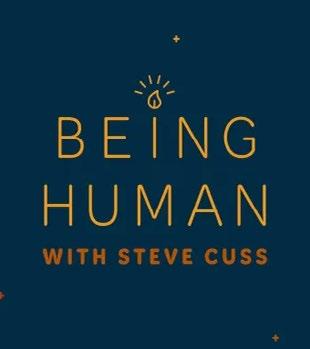
LISTEN
BEING HUMAN WITH STEVE CUSS FEATURING “EUGENE CHO’S GUIDE TO MERCY OVER BURNOUT"
Steve Cuss and Eugene Cho offer wisdom for Christians who want to pursue justice without burning out. They discuss faithful discipleship, engaging politics with compassion, and using our gifts to fght inequity.
Available anywhere you listen to podcasts.
SCAN HERE TO WATCH NOW
SCAN HERE TO LISTEN NOW
Disciples must maintain that delicate balance between the inner and the outer life — contemplation and action. Meditation has no point UNLESS it is firmly rooted in LIFE.


–Thomas Merton

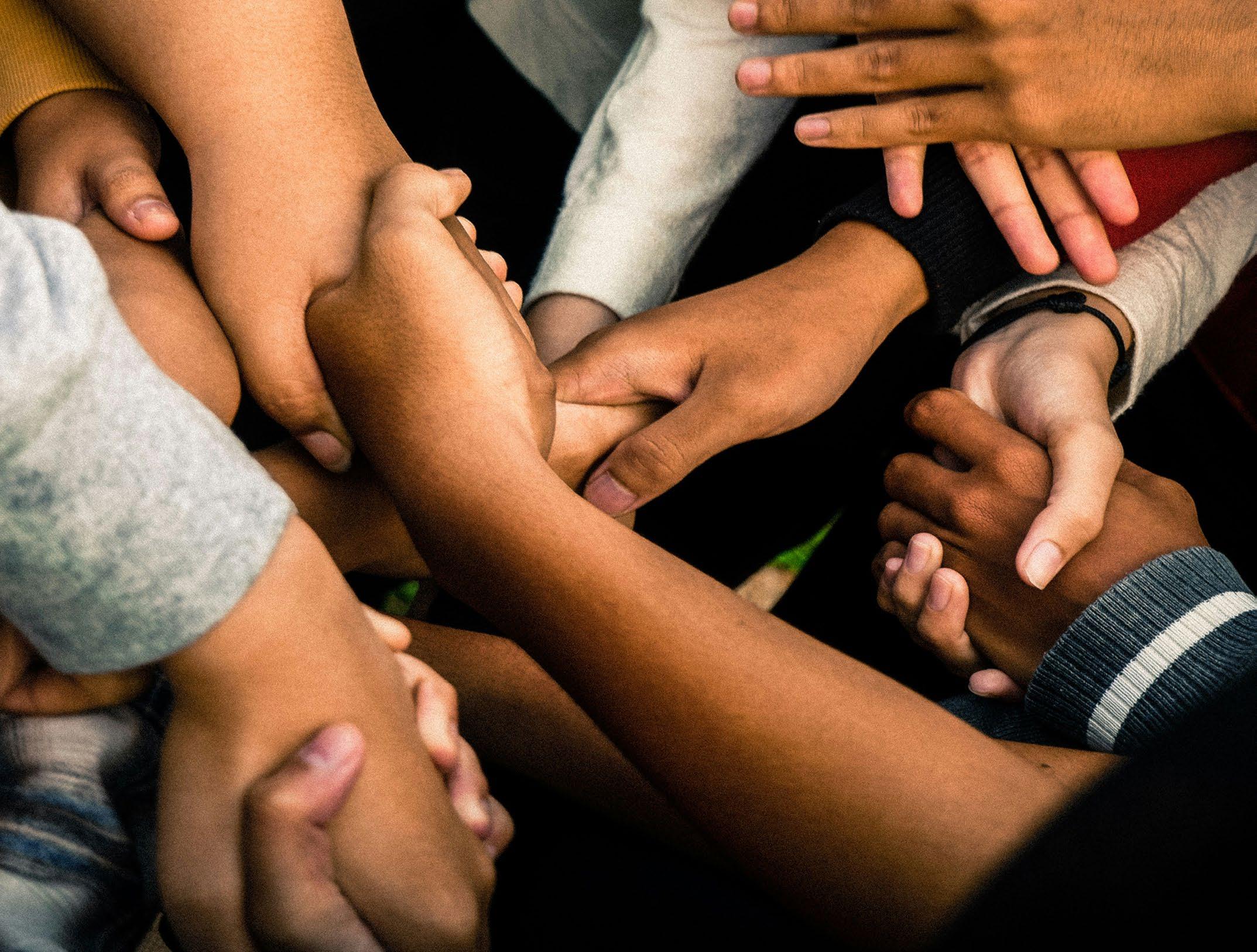
We live in a world where sin has been, in the fullest sense, institutionalized—where for generation after generation, the privileged and powerful rule without risk, exposing others to the deepest vulnerability while excluding them from true authority. Exploiting and suffering sum up the tragedy of our whole human history.
But this is not the way it was supposed to be . . . We are meant to experience more and more of the full authority intended for human beings, which can never be separated from the full vulnerability—the ultimate meaningful risk— of entrusting ourselves to one another and to our Creator. Leadership does not begin with a title or a position. It begins the moment you are concerned more about others’ flourishing than you are about your own. It begins when you start to ask how you might help create and sustain the conditions for others to increase their authority and vulnerability together.
An excerpt from Strong and Weak by Andy Crouch
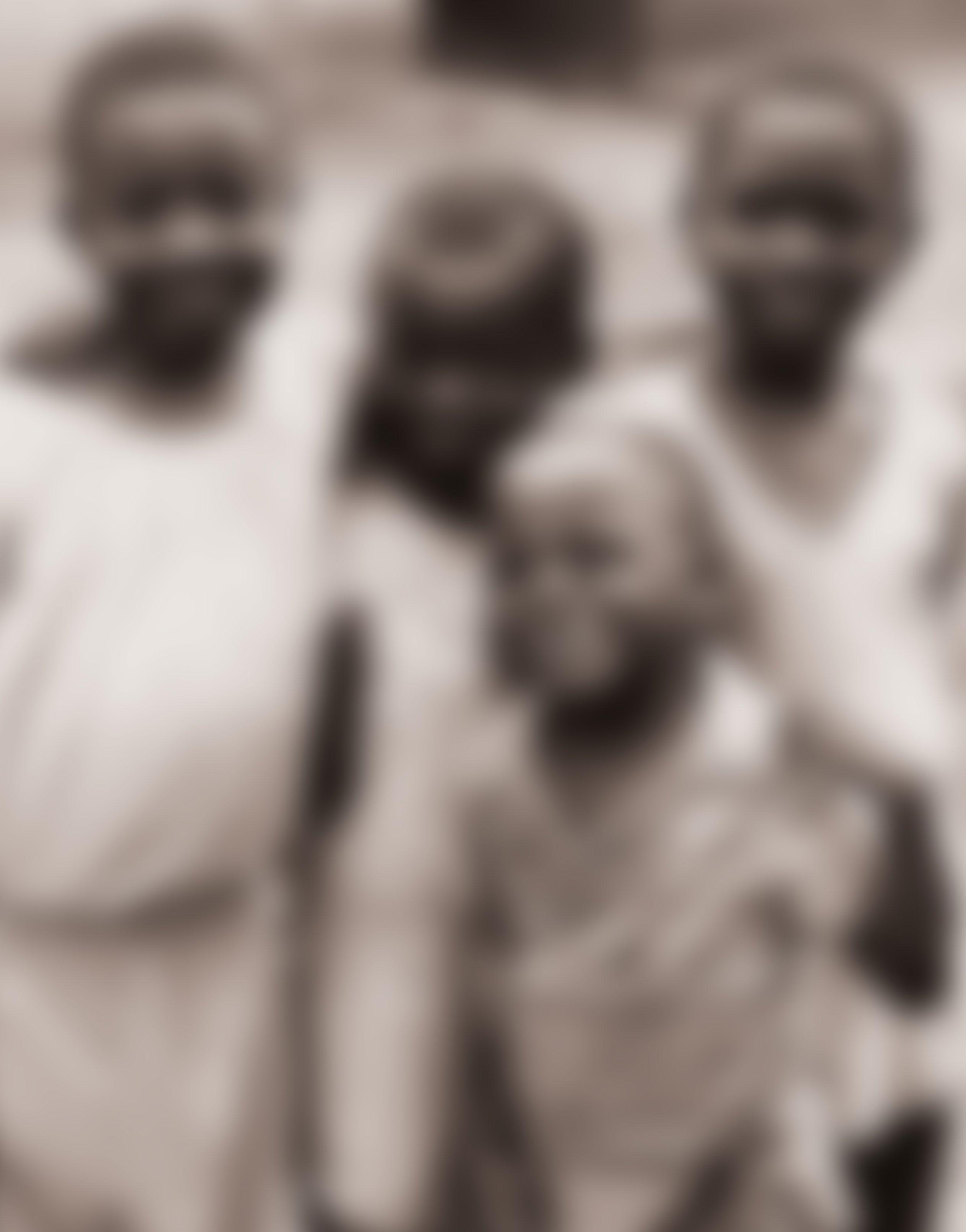
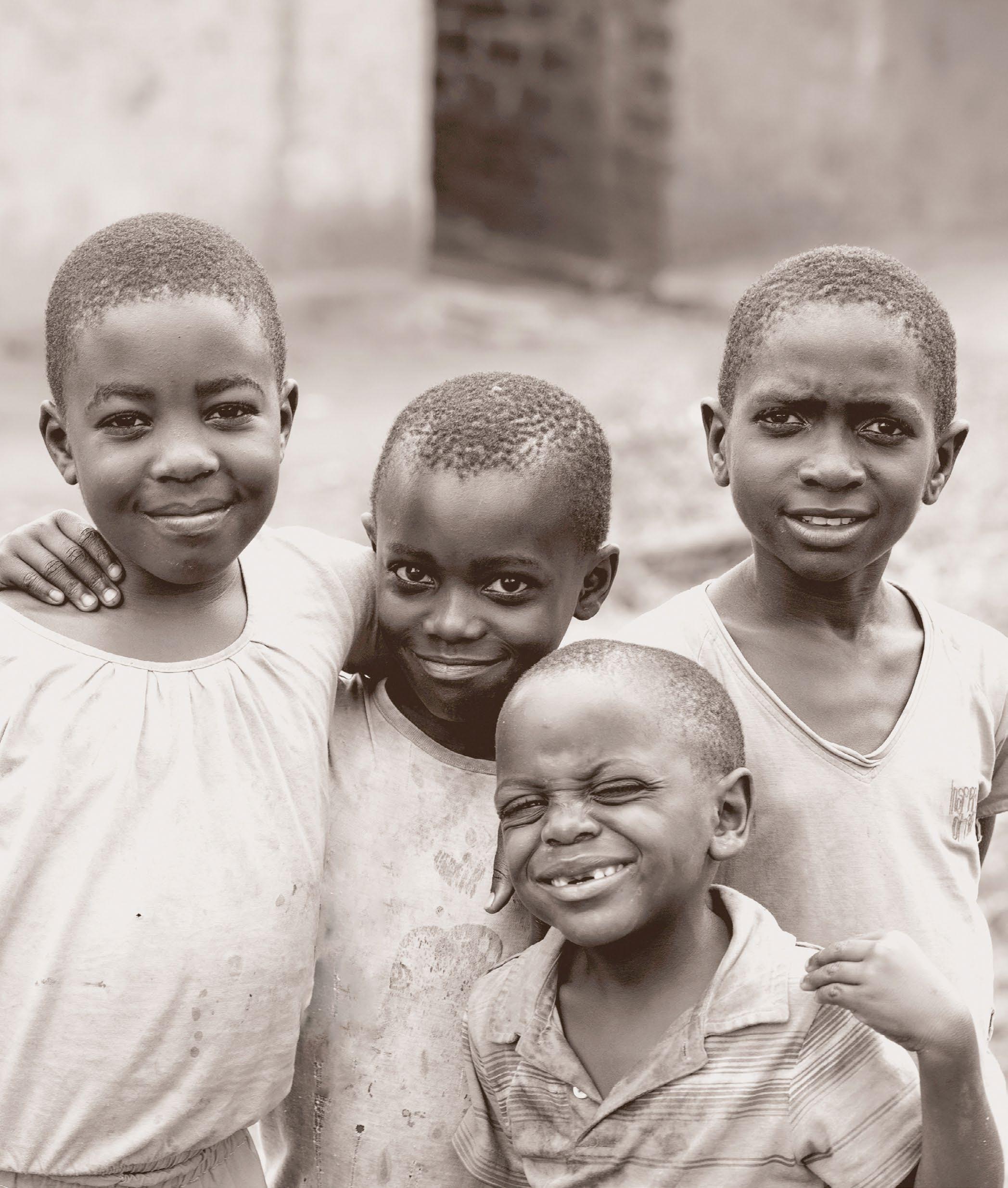
Church of the Nazarene 17001 Prairie Star Pkwy Lenexa, KS 66220
(800) 310-6362 info@ncm.org


